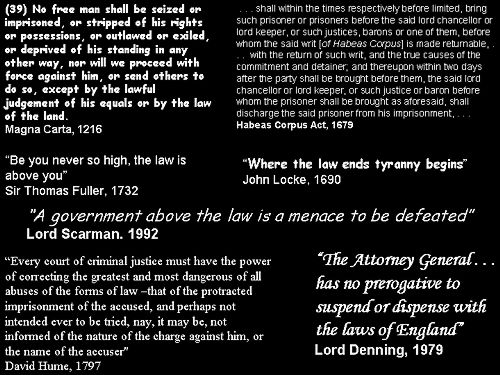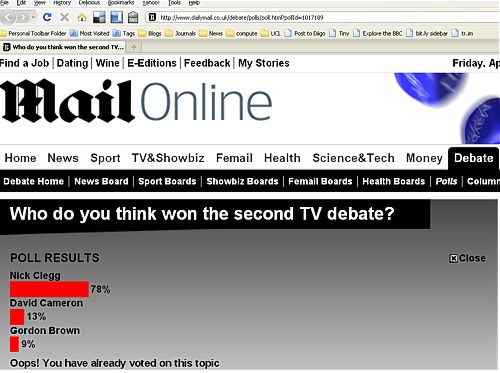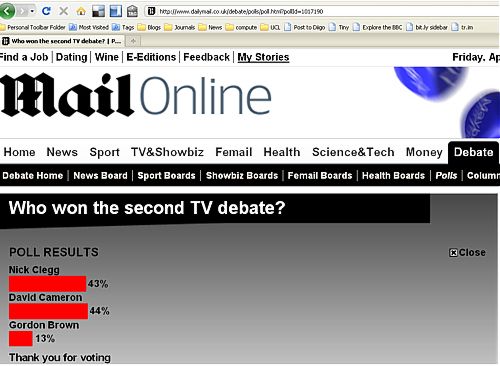David Colquhoun
This week’s edition of Nature Neuroscience carried a paper with the title “Adenosine A1 receptors mediate local anti-nociceptive effects of acupuncture“. The paper was not without interest, but it tells one nothing about acupuncture in humans.
The mice had their paws injected with rather unpleasant stuff called Complete Freund’s Adjuvant. This makes them inflamed and sore, so they are unusually sensitive to pain. When the mice were pierced with human-sized needles, and the needles rotated, they responded a bit less to painful stimuli.
The newspaper reports of this paper were even worse than usual.
The worst of the lot was Richard Alleyne, in the Daily Telegraph: “Acupuncture does work as it stimulates a natural pain killer, scientists find“.
Fiona McCrae in the Daily Mail was marginally better, with “Let’s get straight to the point, acupuncture DOES ease pain“. At least she manages to include a brief critical comment from Edzard Ernst.
Even the usually-excellent Ian Sample in the Guardian was unusually gullible with “Acupuncture may ease pain by triggering release of natural painkiller“. The subheading did say the study was done in mice not man, but there was no critical comment and, as in the other reports, no attempt to summarise what’s known already about acupuncture.
Worse still, it wasn’t just the newspapers. There were similar poor reports in Science magazine, in Scientific American, and even the Nature news blog left a lot to be desired.
When this sort of misreporting occurs, it often seems to come from the press release (another case documented here). Many journalists never get any further than the press release, Here is Nature‘s press release.
|
How needles pierce pain DOI: 10.1038/nn.2562 Acupuncture can relieve many kinds of pain, but it remains unclear how it might work, beyond the possibility of a strong placebo effect. A study published online in Nature Neuroscience now shows that acupuncture locally activates pain-suppressing receptors which could be the key to the treatment’s ability to relieve pain. Maiken Nedergaard and colleagues inserted fine needles into the mouse equivalent of a traditional acupuncture point near the knee, and rotated these needles intermittently as is practiced by acupuncturists. This alleviated the pain reactions of mice with an inflamed paw, and it also strongly increased the local tissue concentration of the neurotransmitter adenosine. Pain relief required the presence of a particular adenosine receptor. It is known that this receptor resides on pain-transmitting nerve fibers and can reduce the activity of these fibers. The authors found that no pain relief or adenosine elevation was observed when the needles were simply inserted into the acupuncture point without rotation. They also noted that a drug that prolongs the lifetime of adenosine in live tissue helped to prolong the pain-attenuating effect of mouse acupuncture. It should be noted that while this work suggests a mechanism for local pain relief by acupuncture, it does not in any way endorse the ancient mystical idea that the needles work by correcting some aberrant “qi” energy flow along “meridians”. Instead, the authors propose a model whereby the minor tissue injury caused by rotated needles triggers adenosine release, which, if close enough to pain-transmitting nerves, can lead to the suppression of local pain. Author contact: |
The title, and the first sentence, are tendentious, to put it mildly. The false assertion that "Acupuncture can relieve many kinds of pain" misrepresents entirely the current state of the evidence. A lot has been written about acupuncture, not least on this blog, but the current position can be summed up roughly as follows.
- It has been found time and time again that no difference can be detected between real and sham acupuncture in blind comparisons, and
- a non-blind comparison between acupuncture and no-acupuncture usually shows some advantage for the acupuncture, but the effect is small, transient and very variable. A recent review from the Nordic Cochrane group concluded the effect was barely big enough to be clinically significant.
The odds are that acupuncture is no more than a theatrical placebo.
The press release should have made all this clear, but failed to do so. But then the paper itself also failed to make the context clear.
The abstract of the paper starts "Acupuncture is an invasive procedure commonly used to relieve pain." The second paragraph starts "Although the analgesic effect of acupuncture is well documented, little is understood about its biological basis". It is simply not true that "analgesic effect of acupuncture is well documented". It is not. Try reading Barker Bausell’s excellent book, “Snake Oil Science” if you want to know about the strength of the evidence.
The whole paper is written with the underlying premise that acupuncture works, and all that needs to be done is to explain why. How the paper got past the referees in its present form beggars belief.
Journals like Nature Neuroscience, like it or not, have a certain prestige. Of course, the prestige is exaggerated, and like all journals, it has some good papers and some poor ones. With that prestige comes responsibility to ensure that press releases are accurate. But one often has the impression that press releases are written with the aim of getting wide press coverage, and prestige for the journal, rather that as critical evaluations of the science. This is one such case.
Martin Rees said today, in his first Reith lecture, that "science is organised scepticism". It should be, and in the long run, it is. This paper is an exception and sadly it isn’t alone.
Other commentaries on this paper
There have already been some excellent commentaries on blogs. As so often, the best bloggers are sharper than the scientific journals. If it were not for the fact that my comments on Twitter got some criticism from Nature, I wouldn’t have bothered to add to the following excellent analyses.
Ed Yong, in the Discover site was quick off the mark with A biological basis for acupuncture, or more evidence for a placebo effect?. This provides more detail than I’ve given here. It also has an intriguing postscript.
“PS: The paper notes that the authors have no competing financial interests that might have affected their work. However, it is worth noting that one of the co-authors, Jurgen Schnermann, is married to one Josephine Briggs. Briggs is the director of the National Center for Complementary and Alternative Medicine [NCCAM], an institute that has had its fair share of controversy in the past.”
NCCAM is, of course the branch of the US National Institutes of Health that has spent over a billion dollars of US taxpayers’ money without coming up with a single good treatment. This is rather fascinating, because the report in the Telegraph ends with a laudatory comment from, ahem. Dr Josephine Briggs.
Dr Josephine Briggs, director of the National Centre for Complementary and Alternative Medicine at the National Institutes of Health in the US, said: “It is clear that acupuncture may activate a number of different mechanisms.
“This carefully performed study identifies adenosine as a new player in the process. It is an interesting contribution to our growing understanding of the complex intervention which is acupuncture.”
James Cole at the Stuff and Nonsense blog has another take on the same work, under the ironic title Acupuncture Works, Say Scientists
At Respectful Insolence, Orac gives a superb and thorough account. Read it: When what an acupuncture study shows is much more interesting than what acupuncture believers think it shows.
Follow-up
This post is about a product called Esperanza Homeopathic Neuropeptide which is marketed for the treatment of multiple sclerosis.
The case is still under investigation by the Medicines & Health Regulatory Authority (MHRA) but so little has been done in the last six months, I thought it was time to bring this heartless scam to public attention.
On 19th September 2009, I got a heartbreaking letter from the mother of a woman who was suffering from multiple sclerosis.
|
I would like to draw your attention to Homoeopathic product advertised in one of the Multiple Sclerosis Magazines called” New Pathways” , A copy is enclosed. We have purchased this product for my daughter who is suffering from MS and paid £3,750.00 for seven months’ supply to what is look like clear water in vials to be sprayed sublingually every day. After six months of regular use, no improvements was noticed in my daughter’s condition, if anything her condition is deteriorating. |
The writer also enclosed a pamphlet that advertised Esperanza neuropeptide (the term homeopathic does not occur in this particular pamphlet). Even by the standards of alternative medicine, it was truly jaw-dropping [download the pamphlet].
The good news is that the pamphlet brought news of a special offer. The price of 12 months’ supply has been reduced from £6,759 to £5,000.
Yes you read that correctly. They want £6,750 (US $12,500) for 12 vials, or £575 for a single vial.
What’s in Esperanza Homeopathic Neuropeptide?
For a start it doesn’t seem to be homeopathic at all. I wrote to Esperanza to ask what the homeopathic dilution was, but got no reply at all. I do hope that the word ‘homeopathic’ has not been added merely to circumvent medicines regulations, (we all know that loopholes in the law can allow homeopaths to get away with murder).
The Esperanza web site states
The Sublingual Homeopathic spray (Esperanza Homeopathic NeuroPeptide) contains a peptide (71 amino acid chain) at a concentration of 10 µg/ml. The daily dose is 6 µg.
The dose mentioned above suggests a vial contains about 20 ml (they don’t say), So at the single vial price that comes to an astounding
£28,670 per litre
(at their rate of exchange that would be over US $53,000 per litre)
I also signed up to get the Esperanza newsletter. The newsletter they sent on 11 November 2009 (see it here) describes the product as Esperanza NeuroPeptide Homeopathic Sublingual Spray. In fairness, it does say it isn’t a "cure" (so you conveniently have to keep on taking it every day). But it does quote Esperanza’s Scientific Director as saying
"This is the only drug that gives back function in MS. It affects ability to walk, motor function, pain, fatigue, speech, co-ordination and balance."
You have to read their web site quite carefully to realise that there are no proper trials whatsoever to back up these claims. It is one of those sciencey-sounding sites that might well be convincing to people not accustomed to reading such stuff.
I guess that pretending that a treatment contains something when it doesn’t (homeopathy) is reversed in this case. They are pretending it contains nothing when it does.
The newsletter quotes Gerry Gallagher, Esperanza’s Chief Executive Officer, as saying
Esperanza NeuroPeptide is derived from a protein called alpha-cobratoxin. This recognizes and attaches to the nicotinic receptor in the brain. In a specific patent-protected chemical process unique to Esperanza NeuroPeptide [sic]. This alpha-cobratoxin is systmatically[sic] changed to create a totally harmless amino acid end-product protein. It lacks measurable toxicity but is still capable of attaching to (and affecting) the nicotine receptors. This means patients cannot overdose and that the end-product is 100% safe and toxin-free.
This alpha-cobratoxin is well known to anyone who works on neuromuscular transmission. It binds very tightly indeed to the nicotinic acetylcholine receptors on muscle fibres and so blocks chemical neurotransmission. This paralyses voluntary movement (including breathing) and so kills you (like curare, but more powerful). There are other sorts of nicotinic receptors in the brain, though only one of them (alpha7) is blocked by things like cobra toxin. This preparation is not cobra toxin (luckily) and its properties are unknown. The claim that it still attaches to receptors but has no obvious effects seems absurd.
What matters is that there is no research that shows any beneficial effect whatsoever in multiple sclerosis.
The case seemed so horrifying that I referred it immediately to Trading Standards on 1 October 2009. Despite the fact that the TS officer concerned had an interest in the medical area, the outcome was zero. No action was taken. After some time arguing with Trading Standards, I eventually I referred the case to the MHRA (on 10 November 2009), In fact they had already been asked about it by the Multiple Sclerosis Society, The MHRA is quite clear that it is not homeopathic and action is likely to follow.
The web site for Esperanza is no better. All sorts of wild claims are made. You can download a powerpoint show, but it won’t tell you anything useful.
The MHRA investigation
Although I submitted a complaint to the MHRA on 10 November 2009, the fist sign of action was on 26 May 2010. I got a brief letter from an assessor in the MHRA’s Advertising Standards Unit
“You may wish to know that the advertisement published in the MSRC magazine has been withdrawn. Esperanza Peptide Ltd has stated that the advertisement will not be repeated and they are not planning to run any more campaigns in the UK for 2010. “
“The Enforcement Group are continuing to investigate this Company and will keep you updated. “
That’s a start but a pretty modest start. Let’s hope that the MHRA will decide to prosecute. The enforcement group tell me that, six months on, they are still investigating. No idea when they’ll finish. One thing, though, emerged early on.
On 11th December 2009, the MHRA told me they agreed that the description as ‘homeopathic’ was inaccurate.
|
The MHRA considers Esperanza a conventional medicinal product and under no circumstances would it ever be acceptable to regulate it under any of the UK homeopathic schemes. Esperanza would require a full Marketing Authorisation and if such an application was made, it would have to be supported by full efficacy data based on the results of clinical trials. |
There exists no such efficacy data, so the company is surely in trouble.
The state of the law
It seems that there is a real problem. Laws that already exist are flouted regularly, with impunity. Those who break the law, get, at most, a mild rap on the knuckles.
The Consumer Protection Regulations (May 2008) make it illegal to claim that a product will benefit your health if you can’t produce evidence to justify the claim. That should be quite enough to regulate quacks (though it would put many of them out of business). The problem is that these admirable laws are barely enforced. Enforcement is the duty of Trading Standards Officers, and they just don’t do the job. This is the response that I got from Trading Standards.
|
. . . we were very sympathetic to the complainant, both of us sharing your own aversion to quack medicine. We looked at the options for action under sch 1 CPRs 17. Falsely claiming that a product is able to cure illnesses, dysfunction or malformations. I am prepared to accept that it is in principle possible to prove such a thing by, most likely, a succession of expert witnesses. However, there is little doubt that the company would provide a vigorous (and well funded) defence. As well as their own ‘experts’ there would likely be a long procession of people into the witness box telling their tale of how they were cured by the drops. Bear in mind the likely scenario for this: a magistrates court with a lay bench. Questions that must properly be addressed by ****shire Council include: what is the likelihood of success? What are the financial risks (with ****shire resident’s money)? What are the benefits to ****shire residents? Has any ****shire resident complained. We concluded that there is in this particular case no proper grounds for us to intervene. |
This response, to such a flagrant case, seems to me pathetic. They decline to enforce the law because no MS sufferer in the local area has been harmed. The law does not require that they should have, but that’s the way Trading Standards works (or, rather, fails to work).
One reason for their ineffectiveness is that the organisation of Trading Standards is desperately out of date. They have not kept up with the internet age. They still work almost entirely via local offices, just as they did when their main job was to check the accuracy of weights on scales used to sell groceries. It is a modus operandi that simply doesn’t work now that they are meant to deal with health frauds that are largely internet-based. One problem is that any particular office is unlikely to have anyone with the specialist knowledge to judge the truth or falsehood of claims that are made for ‘health’ products.
A search of Companies House for “Esperanza” shows the usual trail of dissolved companies but two are still in business, Esperanza London Ltd, (ground floor 25 Balham High Rd.) and Esperanza Peptide Ltd (Largs, Ayrshire). They have moved HQ to Grand Bahama (there’s a surprise) but since they appear on Companies House this should not prevent prosecution .
It is also quite unsatisfactory that the duties of Trading Standards offices overlap heavily with those of the MHRA. In this instance, only the MHRA did anything, and that very slowly.
Follow-up
The MHRA published the following judgement on 4 August 2010.
A healthcare professional complained to the MHRA about an advertisement produced by Esperanza Peptide Ltd for consumers, which was published in the MSRC magazine. The complainant was concerned that the advertisement promoted an unlicensed homeopathic medicine.
The MHRA upheld the complaint. The company agreed to not use the advertisement again in the UK. It stated that it would be making changes to its global website and it would not be promoting it in the UK. The MSRC also withdrew the advertisement from the online version of its magazine.
The term ‘evidence-based medicine’ seemed to me, when I first heard it, utterly ludicrous. It still does. What’s the alternative? Guess-work based medicine?
Quacks are fond of using cuddly words like ‘holistic’ and ‘integrative’, partly, one suspects, in an attempt to gain respectability and to disguise some of their barmier views. See, for example, Prince of Wales Foundation for magic medicine: spin on the meaning of ‘integrated’.
Advocates of evidence-based medicine are often accused by quacks of being hard-hearted calculators who want to take the soul out of medicine. Nothing could be further from the truth in my view. But I don’t practise medicine so it seemed to me to be worth quoting two of the best definitions I know, both from people at the sharp end of medicine.
James Matthew May
James May is a general practioner in London. He is also chairman of Healthwatch, an organisation that was exposing health fraud long before the recent explosion in the ‘skeptical blogosphere’.
The following passage was written as comment (‘rapid reponse’) to an editorial in the British Medical Journal. The editorial itself was (in my view) silly and misguided (Closing the evidence gap in integrative medicine, by Hugh MacPherson, David Peters, and Catherine Zollman). It is best forgotten as soon as possible. But James May’s comment deserves to be preserved and publicised. The highlights in bold font are mine.
|
The use of the term ‘integrative medicine’ in your editorial seems to confuse more than clarify the problem of ‘holism’ in medicine. Complementary therapists for example often use the term ‘holistic’ to blur the boundaries between the therapies used and the practitioner’s interpersonal skills. It would be better, however, to keep these distinctions clear. Caring is different from curing. The point of RCTs is to establish how much of a treatment’s efficacy is independent of the ideas, concerns, and expectations of either the patient or the clinician. Using ‘multi-modal’ or ‘synergistic’ research methods is likely to confuse this important distinction. ‘Holism’ is not a multifaceted approach to curing, it is a mulitfaceted approach to caring. A truly holistic clinician will ‘cure sometimes, relieve often and comfort always’. Comforting may not produce a positive clinical outcome – but we should still do it. Historically speaking caring pre-existed effective medicine by millenia, but it was a principle motive for finding effective medicine. Caring therefore is not a subset of medicine, instead medicine is one of the tools used for caring. ‘Integrative medicine’ as a concept, however, blurs this boundary. It has been wisely observed that ‘if we keep trying to measure what we value, we will end up only valuing what we can measure.’ This particular ‘evidence gap’ is therefore probably best left; filled instead by caring doctors. Effective medicine is best measured with RCTs. Caring is not. ‘Integrative medicine’ therefore risks both damaging how we measure effective medicines (RCTs), as well as reducing caring to measurables. A better term for this might be ‘disintegrative medicine’. Competing interests: Chairman of HealthWatch |
Michael Baum
Baum is a recently-retired cancer surgeon from UCLH. As well as being s surgeon with a strong interest in scientific medicine, he has been at the forefront of thinking about supportive or spiritual care of cancer patients. His 2009 Samuel Gee lecture is available in video, Concepts of Holism in Orthodox and Alternative Medicine. It is a masterpiece. The conclusion puts his view bluntly (again the emphasis is mine).
|
Conclusion Holism in medicine is an open ended and exquisitely complex understanding of human biology that over time has lead to spectacular improvements in the length and quality of life of patients with cancer. This approach encourages us to consider the transcendental as much as the cell and molecular biology of the human organism. Alternative versions of “holistic medicine” that offer claims of miracle cures for cancer by impossible dietary regimens, homeopathy or metaphysical manipulation of non-existent energy fields, are cruel and fraudulent acts that deserve to be criminalized. Such “alternative” versions of holism are arid and closed belief systems, locked in a time warp, incapable of making progress yet quick to deny progress in the field of scientific medicine. |
Follow-up
One member of parliament, above all others, has championed reason for the last 13 years, But Evan Harris was not re-elected in Oxford West and Abingdon. On May 6th he got 23,730 votes, a mere 176 votes fewer than his conservative rival.

Click picture to see hero movie (be patient) (or right click to download mpg file)
Let me declare an interest. Evan Harris is one of the most principled men I have ever had the pleasure to meet. His stands on human rights, civil rights and libel law reform have been exemplary. He is also one of the few (and now fewer) members of parliament who understands how science works and its importance for the future of the UK. He has been a tireless advocate for the idea that policy should be based on evidence (as opposed to guesswork)..
Harris is also an atheist, something that one would not expect to be very relevant in a country where the influence of religion has declined progressively for many years. It would not be relevant if it were not for the fact that his defeat was brought about by poisonous lies propagated by, ahem, evangelical christians. I’m an atheist too, but I have met some good christians, I think they are wrong about their sky fairies, but I also think they should be free to believe in them if they want. Some of them do good things as a result of their beliefs. But not in Oxford West and Abingdon.
The (just) winner was conservative Nicola Blackwood. She is a member of the Conservative Christian Fellowship. But curiously a search of her web site for ‘christian’ shows not a single result. Shouldn’t voters know about your beliefs? It seems distinctly dishonest not to admit that your views come from an old book as interpreted by old men, The voter should know your motives.
Her profile at the Conservative Christian Fellowship says
“Along with many Christians, she is concerned that right to freedom of religion is being undermined without proper understanding of the potential consequences for faith groups or the wider community. In particular, she fears that the voice of Christians and people of other faiths on key issues of conscience is too readily dismissed in public debate.”
But what did Nicola Blackwood know about the smear leaflets?
Nicola Blackwood’s web site not only doesn’t mention the word ‘christian. It says very little about policies of any sort, There is no
mention of euthanasia or any of the other questions raised in pamphlets that were distributed throughout the constituency. There is a well hidden disclaimer
"Nicola has distanced the Conservative Party from literature distributed by private individuals and special interest and pressure groups attacking her opponent".
That is a pretty weak response to the poisonous and inaccurate leaflets that were circulated (they can be seen here). The worst stuff came form two sources
The Reverend Lynda Rose.
Lynda Rose is an Anglican minister who seems to think it appropriate to call a good man "Dr Death" because of her religious ‘principles’. Here is part of her leaflet

Lynda Rose has extreme "pro-life" views, more like those of the pope than of the average anglican. She seems not unlike the extreme right wing fundamentalist religious groups found in the USA. Harris told the Oxford Mail that
“It is a pity that, instead of putting up a candidate to contest the election, an anonymous group, using money from no-one knows where, is distributing an inaccurate personal attack leaflet in this constituency for the first time ever.
“It is offensive and I would say profoundly unchristian to use the term Dr Death – associated with Nazi murderer Joseph Mengele or mass-murderer Harold Shipman – to describe any politician.”
The Reverend Rose replied to the this in a letter to the Oxford Mail (April 26th) that is reproduced on the web site Anglican
Mainstream ("Anglo-catholic, Evangelical, Orthodox, Charismatic, Mainstream"). There is not a word of apology for vilely defamatory use of “Dr Death”, but merely a huffy defence of Hansard’s voting records.
That takes some beating as uncharitable, intolerant, inaccurate (and defamatory) comment. But there is even worse to come.
Keith Mann was another candidate in the same election. In 1994 Mann was sentenced to 14 years in jail, reduced to 11 years on appeal, for 21 offences including possession of explosives, incitement, criminal damage, and escape from custody (from Wikipedia). His leaflets were even worse than those of the Reverend Lynda Rose.

This vile calumny, full of inaccurate allegations and written by someone wth a serious criminal record, was aimed at a deeply-principled man. No doubt helped Nicola Blackwood to scrape in, but I can find no direct denunciation of it from Ms Blackwood. Christians don’t seem to be fussy about their allies.
Then there were the newspapers, in particular the Daily Telegraph.
Cristina Odone was editor of the Catholic Herald from 1991 to 1996. She is another ‘good christian’ who wrote an abominably nasty piece in the Daily Telegraph on April 19th. The Lib Dems are a Jekyll and Hyde party. Forget nice Mr Clegg. What about ‘Dr Death’? It is worth looking at it as a prime example of inaccurate, ad hominem, nastiness. It is also worth looking at for the comments: there were a lot of comments (thanks to an alert via Twitter) and most of them were along the lines of this of one of the first, from the redoubtable skepchick
"Thanks for the heads up, Cristina! Now I know to cheer for the LibDems. I want to know that if I end up in a vegetative state, I’m given a peaceful death rather than my own Telegraph column."
Most importantly, read the calm, diginified and polite response from Evan Harris himself.
I have never said that that the current abortion rate is not of import (you just made that up Christina!) and indeed have argued for more effective sex and relationships education as other countries manage and which also delays first sexual intercourse. And for better access to effective contraception. We can disagree on that too but best to have a rational discussion rather than a distortion.
I have never said “God is bad, his followers mad”. You made that up again Christina! I respect the religious view actually but believe that the state should be neutral on religion and it should not be privileged by the state above other beliefs.
My own comment took a while because of the Telegraph’s clunky registration system.
“This truly vile piece of writing shows all the tolerance of an Ayatollah who advocates rule by religious dogma (well actually, of course, by his own opinions). There could hardly be a worse moment to seek to impose catholic values on the rest of society. That church, including its head, has been seem to fail to report to the police the most vile crimes. It is in deep disgrace precisely because of its lack of moral principles.
One thing was very clear: she doesn’t understand the web. Her follow-up article seemed to think that the response was organised by Lib Den HQ! The Lib Dems’ spooky posse of internet pests. Sorry, Ms Odone, but these days concerned individuals can speak up.
The Reverand Goerge Pitcher, anglican minister at St Bride’s church, Fleet Street, was the next priest to bring disgrace on christianity with another incredibly nasty piece, again in the Telegraph, The best result of the election: Let’s rejoice that Lib Dem Evan Harris has lost his seat.
Again there were many hostile comments, including quite a lot from christians.
“Speaking as a Christian, I find it amazing how many Christians are capable of being thoroughly nasty about people they dislike. I have made a mental note that if I ever find myself seeking a church in central London, I shall avoid St Brides, Fleet St like the plague.”
and from ex-christians
“Dr Evan Harris is more of a doctor than either you or Nadine Dorris are “human beings”. You are both spiteful, evil people, and you are exactly the sort of person that drove me to reject the Catholic Church, and ask for an official notice of my defection to be placed in the baptismal register of my parish.”
Father Raymond Blake is another cleric who thinks you should vote according to his interpretation of the bible. His web site is as political as that of the christian taleban of the southern USA,
and just about as charitable. He too uses the "Dr Death" abuse, with no consideration of what Harris actually advocates.
How is it that christians (and homeopaths) can be quite so unpleasant?
Religious people, and those with other belief systems that resemble religions are supposed, traditionally, to be warm, caring people, charitable, forgiving and selfless, That, at least is the image they like to cultivate. Of course it has never been quite as simple as that. Just think of the inquisition, the warring catholics and protestants and, right now, the sordid disgrace of child rape, and its cover up by the highest officials of the vatican.
Last easter, I added a bit to the 2008 diary section of this blog about why I’m not a christian It seems to be worth repeating here.
"When I was about 15 I went to a Summer camp which turned out to be run by christian evangelists (my parents swore they didn’t realise that it was a brain-washing camp). I was converted and became rather earnest. Then, at 18, I met a nurse. Being on Merseyside, she was Irish. And being 18, I was rather interested in sex. The price of sex was to go with her to mass, so of course I went. It was Easter and they were doing the Twelve Stations of the Cross. I still recall watching this, with mounting horror. The priests were just enjoying it too much. It was almost like a sado-masochistic orgy. The priests seemed to be almost masturbating. It was simply sick."
I was reminded of this streak of cruelty that runs through christianity by the comment made by an aide to Tony Blair who said
“I couldn’t help feeling TB was rather relishing his first blooding as PM, sending the boys into action. Despite all the necessary stuff about taking action ‘with a heavy heart’, I think he feels it is part of his coming of age as a leader.”
His enthusiasm for a war that has killed over 100,000 people (and cost a small fortune) seems sadly consistent with his catholicism,
Despite all this, some individual religious people have done good for humankind.
Likewise proponents of magic medicine are proud of their individual caring approach and this may indeed be helpful in eliciting a good placebo response.
The problem seems to be that neither group can tolerate criticism. They aren’t interesting in discussing anything, because they just know they are right. And if anyone tries to express an opinion that differs from their own, the niceness vanishes like the snow in spring.
The quotations above show the downright nasty vindictiveness of religious people towards an honourable man who happens to hold somewhat different views to their own.
Likewise the cuddly homeopaths show astonishing abusive nastiness to anyone who doesn’t believe in their magic. I allow them to say what they want on this blog but they routinely delete comments. Along with most of my scientific friends, I’ve been subject to abuse and utterly incorrect allegations. I don’t enjoy it, but if its the price of free speech, so be it.
I fear that these things represent the incursion into UK politics of the extreme polarisation seen in the USA. a place where religious people seem to think it is moral to shoot doctors who do abortions.
Some morality. Thank you Tony Blair.
Some other blogs on this topic
Dr Aust wrote Catholicism plus writing in the Telegraph apparently makes you barking mad.
Tessera wrote Playing dirty politics. Attacks on Dr Evan Harris
A liberal Dose (Neil Fawcett) wrote Extremists to the left of me, fundies to the right.
Richard Dawkins wrote Evan Harris: Is this why he lost his seat?
Ophelia Benson wrote three good posts (via comment from Swiss Frank)
http://www.butterfliesandwheels.org/2010/gloating-for-britain/
http://www.butterfliesandwheels.org/2010/byrnes-on-harris-pitcher-on-pitcher/
http://www.butterfliesandwheels.org/2010/peculiar-george/and, via Butterflies and Wheels,
Clifford Longley has trenchant comment on Platitude of the Day
Follow-up
Texas schools board rewrites US history with lessons promoting God and guns. Chris McGreal, in the Guardian writes about the sort of thing that the clerics mentioned here might love.
“US Christian conservatives drop references to slave trade and sideline Thomas Jefferson who backed church-state separation”
“Several changes include sidelining Thomas Jefferson, who favoured separation of church and state, while introducing a new focus on the “significant contributions” of pro-slavery Confederate leaders during the civil war.”
“The new curriculum asserts that “the right to keep and bear arms” is an important element of a democratic society. Study of Sir Isaac Newton is dropped in favour of examining scientific advances through military technology.
There is also a suggestion that the anti-communist witch-hunt by Senator Joseph McCarthy in the 1950s may have been justified.
The education board has dropped references to the slave trade in favour of calling it the more innocuous “Atlantic triangular trade”, and recasts the Israeli-Palestinian conflict as driven by Islamic fundamentalism.”
Sometimes I wonder why one bothers with print. You don’t have active links, you don’t get discussion in comments, and editors alter what you want to say.
This post is about events that followed the removal by the University of Buckingham of its accreditation of the Diploma in Integrated Medicine, as described here.. This diploma was run by the "Faculty of Integrated Medicine" (FIM) which consists largely of Dr Rosy Daniel and Dr Mark Atkinson. The FIM is, in turn, the product of a charity, the Integrated Health Trust (IHT). Oddly enough, the IHT’s web site still says "The two-year, part-time Membership Programme in Integrated Medicine has been accredited as a post-graduate diploma by the University of Buckingham" (as of 13 May 2010). The FIM web site makes similar claims. "Used to be" accredited would be more appropriate.
The advisory board of IHT consists almost entirely of supporters of various forms of alternative medicine, some of whom have been mentioned already on this blog. The respectable supporters who appeared when FIM’s diploma was first announced have vanished, and now they rely entirely on a couple of celebrity endorsements, and a few anecdotes about miracle cures. This is behaviour that is characteristic of all quacks.
After the post here, the story was printed on 13th April in Times Higher Education, under the headline It’s terminal for integrated medicine diploma. On 25th April a reply from Dr Daniel on the THE web site, ‘Terminal’? We’ve only just begun. This attracted a lot of comments. I rather liked the first one,
“The question is: who will stand up and support the formalisation of IM education for doctors and nurses in the UK?”. Not anyone with more than one working neuron, that’s who.
My own comment was rather more restrained than some of the semi-literate abuse from alternative medicine enthusiasts.
On 29th April, Daniel got another go in on the Times Higher Education web site, with the title ‘Bad’ Scientist. This time she got rather personal. Realising that not everyone reads the web version, I thought a print response was called for. I sent them a full response. At their request it was
cut down to the length of a letter, and even then they cut out the reference to Andrew Weil. The abbreviated letter was published on 13th May as Don’t shoot the messenger.
For the record, here is the complete response that I sent.
|
In response to your report [It’s terminal for integrated medicine diploma] and my blog Dr Daniel, in her two recent contributions to THE [‘Terminal’? We’ve only just begun, and ‘Bad’ Scientist], Dr Daniel describes me as misguided, intimidatory, undemocratic, antisocial and prejudiced. Ouch. I can understand that she may well be a bit upset, having recently been rejected by both the University of Buckingham and even by that bastion of all things barmy, the Prince’s Foundation for Integrated Health (now deceased). I’d like to remind her that it was not I who closed the Buckingham course. That decision was made by Terence Kealey (Buckingham’s VC) and Prof Andrew Miles. And it was the Office of Trading Standards, not I, who made her change the claims on her company’s web page about the alleged “healing” powers of a herbal concoction, Carctol, for cancer. All that I did was help to find out about some of the things that were being taught on her course. I find it quite surprising how often vice-chancellors have no idea what’s going on, but Kealey, unlike most, was interested to find out. Dr Daniel is right about one thing. I’m not a clinician. On the other hand, I do perhaps know a little bit about evidence. She claims that diet can save you from breast cancer but in the comments section it has already been pointed out that the 2007 study invoked by Dr Daniel does not come to the conclusion that she said it does. Furthermore she ignores entirely the 2010 EPIC study, published in the Journal of the National Cancer Institute (102:529-537). This study, of almost 500,000 people in ten European countries, found barely any relationship between intake of fruit and vegetables and cancer risk. This may be disappointing, but it can only harm patients to ignore the evidence when, as in this case, it exists. There are plenty of reasons to eat well, but apparently avoiding cancer is not one of them. It seems to be a bit more complicated than that. Dr Daniel says "IM in the UK is still clouded by complementary and alternative medicine (CAM) detractors owing to an important misunderstanding: IM is not CAM.". I beg to differ. The content of the course is about alternative as you can get. It included teachers who have advocated the Q-link pendant to "protect" you from evil radio waves. It is not long since Ben Goldacre opened one of these pendants and found it contained "No microchip. A coil connected to nothing. And a zero-ohm resistor, which costs half a penny, and is connected to nothing". You can’t get more alternative than that. We are told that a new programme is to be launched in May by "advisory board member, Andrew Weil. If you want to learn more about Weil, I suggest the article by ex-editor of the New England Journal of Medicine, Arnold Relman [A Trip to Stonesville: Some Notes on Andrew Weil (1998)]. That is the Dr Weil who has claimed he has insights into medical truth while under the influence of drugs. It is also the Dr Weil who, last year, was threatened with criminal prosecution in a warning letter sent jointly from the Food and Drugs Administration and the Federal Trade Commission because of “Unapproved/Uncleared/Unauthorized Products Related to the H1N1 Flu Virus” In fact every good doctor takes into account the " interaction of emotional, social and physical needs". There is no need to call this "integrative". it is just good medicine. I suggest looking at Michael Baum’s superb Samuel Gee lecture, "Concepts of holism in orthodox and alternative medicine". We are told that "The IHT is now looking for a strong collaborating university partner that will not be intimidated by the likes of Colquhoun". I’m sorry that Dr Daniel sees my approach as "intimidation" and “scare tactics”. The fact of the matter is that the content of the course is truly scary. Once what is taught on courses on alternative medicine is made public, the courses usually seem to close. The contents are just too embarrassing for even the most mercenary vice-chancellor to tolerate. Dr Daniel tells us she is “now looking for a strong collaborating university partner”. If any universities are tempted, I’d suggest that they should first write to the vice-chancellor of Buckingham, Terence Kealey, to seek his advice. |
Follow-up
Still no takers for FIM: June 2010. I made some enquiries about rumours that the Faculty of Integrated Medicine (FIM), having been fired by Buckingham, and rejected by the Prince’s Foundation (deceased), would seek validation from another institution. The University of Bristol says it has not been contacted by FIM. The University of Middlesex, which still runs several courses in magic medicine, was a more likely taker. However, after a long correspondence they responded as follows on June 15, 2010.
“Following an approach by Dr Rosy Daniel to the University, an informal meeting took place between Dr Daniel and our Associate Dean, Academic Development. As a result of that meeting and conversations with other colleagues in the University it was decided that proposals for the University to become a validating partner for the Faculty of Integrated Medicine would not be taken forward. The decision was relayed to Dr Daniel orally.”
3 March 2011. Unsurprisingly, Dr Daniel is up and running again, under the name of the British College of Integrated Medicine. The only change seems to be that Mark Atkinson has jumped ship altogether, and, of course, she is now unable to claim endorsement by Buckingham, or any other university. Sadly, though, Karol Sikora seems to have learned nothing from the saga at the University of Buckingham. He is still there as chair of the Medical Advisory Board, along with the usual suspects mentioned above.
|
Hot off the press The Prince’s Foundation for Integrated Health (FIH) has been spreading misinformation about medicine since 1993. It has featured often on this blog. Now it has closed its doors. |
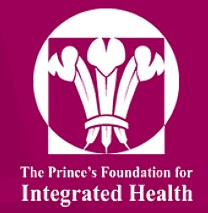
|
An announcement has appeared on the FIH website
|
30 April 2010 The Trustees of The Prince’s Foundation for Integrated Health have decided to close the charity. |
The announcement goes on
"Whilst the closure has been planned for many months and is part of an agreed strategy, the Trustees have brought forward the closure timetable as a result of a fraud investigation at the charity."
"The Trustees feel that The Foundation has achieved its key objective of promoting the use of integrated health. Since The Foundation was set up in 1993, integrated health has become part of the mainstream healthcare agenda, with over half a million patients using complementary therapies each year, alongside conventional medicine. . . "
While the immediate precipitating cause may have been the fraud (see below), the idea that the Foundation "has achieved its key objective of promoting the use of integrated health" seems like a ludicrous bit of make-believe. Well, make-believe is something with which the Foundation was quite familiar. At a time when university courses in quackery are vanishing like the snow in springtime, they can hardly believe that their aims have been achieved. But I guess one could not expect them to say "sorry folks, we were wrong all along".
The 2010 Conference is cancelled too
Judging by the quality of the 2009 conference, which I analysed at length last year, the cancellation of the 2010 conference is very welcome news (except perhaps to a few sycophants looking for honours).
What next? A College?
The rumour is that a “College of Integrated Medicine” may arise from the ashes of FIH. Or even, heaven forbid. a Royal College of Integrated baloney. Since universities seem to be deciding that it isn’t sensible to teach myth as truth, i is not unlikely.
“Prince Charles’s aide at homeopathy charity arrested on suspicion of fraud“
This headline, of an article in the Guardian, by Robert Booth, was not entirely unexpected.
The parlous state of the accounts at the Prince’s Foundation for Integrated Health has been documented already at
Gimpy’s blog.
“An aide in Prince Charles’s campaign for wider use of complementary medicine in the NHS was arrested at dawn today on suspicion of fraud and money-laundering at the prince’s health charity.
A 49-year old man, understood to be a former senior official at the Prince’s Foundation for Integrated Health, was taken into custody at a police station in north London. He was arrested alongside a 54-year-old woman, who was being held at the same address.
The arrests follow a police investigation into £300,000 unaccounted for in the books of the charity, of which the Prince is president.”
More news will appear here, as it comes in.
Follow-up
Other posts on this topic appeared rapidly.
The Guardian 30 April. Robert Booth Prince of Wales’s health charity wound up in wake of fraud investigation
Dr Aust’s Spleen 30 April In memoriam. In which Dr Aust gets a bit poetic
Quackometer 30 April. Prince’s Foundation for Integrated Health Closes. Prince Charles’ Toad Eaters are no more.
Followed by the rest of the mainstream media.
Edzard Ernst 1 May 2010, in the Indepenndent. Better than any journalist. Why alternative medicine wins from the foundation’s demise. Read it! Here are some quotations.
“I therefore think that the FIH has become a lobby group for unproven and disproven treatments populated by sycophants.”
“The FIH has repeatedly been economical with the truth. For instance when it published a DoH-sponsored patient guide that was devoid of evidence. They claimed evidence was never meant to be included. But I had seen a draft where it was and friends have seen the contract with the DoH where “evidence” was an important element. “
“I hope that, after the demise of FIH, the discussion about alternative medicine in the UK can once more become rational. I also hope that Prince Charles has the greatness of selecting advisers who actually advise rather than “Yes Men” who are hoping to see their names on the next Honours List. “
1 May 2010. According to Martin Delgado, in the Daily Mail, the people who were arrested on suspicion of fraud were accountant George Gray and his wife. Gray was Finance Director and acting Chief Executive of FIH. About as senior as you can get.
Gray spent two weeks (two weeks?) at Diabetes UK in 2004 before becoming finance director at the Leadership Foundation For Higher Education.
I voted labour in every election (apart from my very first) up to and including 1997. This is about my feelings for the 2010 election. Make up your own mind (but don’t let Rupert Murdoch manipulate you).
Downloadable button from Mark Golding at http://www.coia.org.uk
Don’t Get Fooled Again “I agree with Rupert“
By 2001 election, I had been forced to the conclusion that Tony Blair had views that were well to the right of Margaret Thatcher’s, in many areas that mattered to me. so I voted Lib Dem. That was before 9/11 After that event, all doubt was gone, so the 2005 election it was Lib Dem again.
I won’t even consider the Conservative party much. I have never understood how anyone could vote for them, ever. The only choice for me is Lib Dem versus Labour. Let’s try to be fair. Labour has done some good things (though most of them would probably have been done by Lib Dems too).
- Minimum Wage Act 1998 was a great innovation
- The Freedom of Information Act (2000) was a major step forward for openness and democracy.
- Nursery school places have increased
- Heating allowances for pensioners (though not sure that I should have got it)
- The funding for the NHS was increased considerably and it has been very good for me (see Why I love the NHS).
- Funding for science increased considerably
Against the big increases for the NHS must be set the huge increase in the number of highly-paid managers, relative to the number of nurses and doctors, that has occurred under Labour.
Bad things that labour has done
It was obvious from an early stage that Labour were in favour of selective schools (but were not honest about). They certainly favoured religious selective schools, and still do.
The explicit support of Tony Blair for creationist schools and his implicit support for homeopathy are distasteful, but not in themselves sufficient reason for voting against him. The decisive thing for me is the Labour government’s careless attitude to human rights and free speech.
Nothing made that clearer than the Iraq war and its aftermath.
Saddam Hussein was a wicked dictator, Sadly the world has many wicked dictators. One wishes they would all go away. But only one of the world’s wicked dictators was singled out to be invaded. It was already clear before 1997that Iraq had been picked out by American neoconservatives as a ‘special case’. They didn’t get far until the election of George Bush in 2001, and the tragedy of the twin towers, 9/11, gave them the chance they sought.
George Bush was perhaps the most extreme right wing president in US History (as well as one of the most stupid). As someone who seemed to have difficulty in distinguishing between real life and a B-movie, his behaviour may not be surprising, but it brought shame on his country. His regime’s legitimisation of torture is, to my mind, the greatest disgrace that has happened during my adult lifetime.
It was with increasing incredulity that I watched Tony Blair’s poodle-like behaviour to Bush. It seemed incredible that any normal human. let alone a Labour prime minister could behave like that. The sight of two such men, both believing that god was on their side was scary in the extreme.
Some things are in danger of being forgotten with the passing of time. All these and much more were documented on my politics blog, up to the point when Blair left office.
- Remember the US governments legalisation of torture. That caused no wavering in Blair’s support.
- Remember the plagiarised dossier? Any student would have been fired for that, but Blair shrugged it off.
- Remember how the attorney general mysteriously changed his mind about the legality of the war?
- Remember Abu Ghraib? If not, read Seymour Hersh.
- Remember the ex-aide to Blair who said
“I couldn’t help feeling TB was rather relishing his first blooding as PM, sending the boys into action. Despite all the necessary stuff about taking action ‘with a heavy heart’, I think he feels
it is part of his coming of age as a leader.”and how the government tried to tone down his remarks.
- Remember David Kelly? The death of a good man must be largely the fault of Blair’s government.
- Remember how, eventually, generals and even neocons turned on Bush, but Blair would still not admit any mistake?
- Remember the Hutton report, and the vicious attacks on the BBC’s independence that followed it?
- Remember the attempts to conceal ‘rendition’ (i.e. .torture by proxy).
- Remember the wonderful efforts of UCL lawyer, Phillipe Sands, to expose illegal activities by both US and UK governments. He is someone of whom UCL can be very proud.
The good done by the Freedom of Information Act has to be set against their sloppy attitude to human rights, as evidenced by their constant attempts to extended detention without charge or trial. In 2004 I made the following poster, based on a dramatic front page of the Independent, 18th Dec. 2004. It is still relevant.
This followed the ruling pf the Law Lords that the government’s detention policy was illegal
“The real threat to the life of the nation, in the sense of a people living in accordance with its traditional laws and political values, comes not from terrorism but from laws such as these. That is the true measure of what terrorism may achieve. It is for Parliament to decide whether to give the terrorists such a victory.” Lord Justice Hoffmann, in the 8-1 ruling of the Law Lords that the UK government’s policy of detention without charge is illegal. [Washington Post] , [Original report]
The sight of Blair acquiescing to the wish of the most right-wing neoconservative government in the western world sickened me unspeakably, and still does, The happy days of 1997 seemed to be a long way away.
That was Blair, but Gordon Brown and most of the Labour cabinet looked on and did nothing.
David Miliband said “You’ve punished us enough about Iraq”. Well no, you haven’t been punished at all, Yet. As someone said on twitter, resuscitate the 100,000 dead and we’ll forgive you.
|
I’m still baffled about why the crowd that gathered in UCL’s quad for the start of the second great march on 20th March 2003, were able to predict the outcome of the invasion so much more accurately than the government. |
UCL quadrangle 20 March 2003 Click here to download high resolution |
Apart from the war
Brown is guilty not only of supporting the war.
He has supported segregated religious schools and the reintroduction of "academy" schools, both being ways of surreptitiously re-introducing selection into the education system
He and Blair presided over an endless multiplication of box-ticking quangos. The intention was, no doubt to increase quality, but the effect has been exactly the opposite. Just look, for example, at Skills for Health, the QAA, the QCA and a multitude of others.
These are some of the reasons that I cannot vote "Labour" this time. They have become. in many ways, a party of the right, barely distinguishable from the Conservative party (and in some respects, further to the right). Remember that the Conservatives supported Blair in his love affair with George Bush, they support selective schools, they support religious schools. And they are even more likely that Labour to sell their soul to Rupert Murdoch. Imagine Fox "News" coming to the UK and be afraid, very afraid.
Why Liberal Democrats?
Since I find it impossible to vote Labour this time. they are the only option. But I think one can be a bit more positive than that.
Some of the reasons why are listed in a letter in today’s Guardian (the list of signatories is remarkable). The Lib Dem manifesto is here.
- The Lib Dems are more likely than the other parties to roll back New Labour’s attack on civil liberties
- Lib Dems tax and green policies look pretty good to me.
- The cost of replacing Trident missiles could be around £100 billion, and if that were spent it is doubtful whether what you get is useful under present conditions. Only Lib Dems would rethink this ghastly waste of money. Brown and Cameron prefer macho posturing.
- Brown’s judgment about banks was wrong, yet he still won’t separate the casino banks and the savings banks. Lib Dem’s would.
- Lib Dems have been more open about how cuts would be made than other parties (if not 100%). Vince Cable for Chancellor.
- Nick Clegg’s response to the letter sent party leaders by the Campaign for Science & Engineering CaSE) was clearly better than the others,in many respects. See also Lib Dems science policy test
- Can you imagine a better science minister than Dr Evan Harris?. I can’t.
Follow-up
This morning I noticed a Daily Mail poll for the winner of last night’s leaders’ debate, so I cast my vote
The results looked like this
(This picture was recorded after lunch at 14.29, so it says I’d already voted.) At the time of writing it is still there, at http://www.dailymail.co.uk/debate/polls/poll.html?pollId=1017189, though not for much longer I suspect.
Then I saw on Twitter a link to the refpls web site. They had very smartly noticed that the URL for the poll, linked from the Mail’s front page, and from the article on the debate, had changed to http://www.dailymail.co.uk/debate/polls/poll.html?pollId=1017190, So I voted again there and this time I wasn’t told I’d already voted. The result was utterly different. At about 14.30 it showed Cameron ahead (just).
Admittedly the first poll shows a pretty exaggerated idea of Clegg’s lead. That’s why on-line polls like this are worth next-to-nothing,
It seems that the Daily Mail. not liking the result of their first poll, simply trashed it and began again.
Even by the standards of the Daily Mail, that is cynical dishonesty.
You can vote yourself in the second version at http://www.dailymail.co.uk/debate/polls/poll.html?pollId=1017190
There is something very offensive about the idea that a ‘bachelor of science’ degree can be awarded by a university, as a prize for memorising gobbledygook.
Once the contents of the ‘degrees’ has been exposed to public ridicule, many universities have stopped doing it. All (or nearly all) of these pseudo-degrees have closed at the University of Salford, the University of Central Lancashire, Robert Gordon University, the University of Buckingham, and even at the University of Westminster (the worst offender), one course has closed (with rumours of more to follow).
|
I’ve already written about the course in Traditional Chinese Medicine at the University of Salford (Chinese medicine -acupuncture gobbledygook revealed) and at the University of Westminster: see Why degrees in Chinese medicine are a danger to patients. The former has closed, but not the latter. Here is another one. One place that has yet to come under close scrutiny is Middlesex University. |
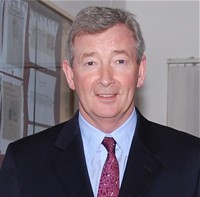
Michael Driscoll, VC of Middlesex University. The buck stops with him. |
Their “Complementary Health” courses are as follows (April 2010).
- Complementary Health Sciences (Ayurveda) Degree, BSc Honours
- Herbal Medicine Degree, BSc Honours
- Traditional Chinese Acupuncture Degree, BSc Honours
- Traditional Chinese Medicine Degree, BSc Honours
and also two postgraduate courses
I asked Middlesex University for samples of their teaching materials under the Freedom of Information Act, and, as usual, the request was refused. As usual, I then asked for the mandatory internal review of the decision, and this time, most unusually, the internal review did not confirm the initial refusal and I was sent a bundle of teaching materials about Chinese Herbal Medicine, It was not all I asked for, but it is quite enough to show the absurd ideas that are still being taught as part of bachelor of Science degree in a UK University.
Not only are the ideas absurd, pre-scientific, indeed antiscientific. They are also dangerous. People who have been taught this nonsense are going out and being let loose on sick people.
The vice-chancellor of Middlesex University, Professor Michael Driscoll, is an economist, not a biologist. Surely you don’t need to be a scientist to feel a bit suspicious when you read on the Middlesex web site about
Traditional Chinese Acupuncture and Moxibustion including distribution of meridians-collaterals and location of acupoints; needling and moxibustion techniques;
Have any of the members of the Executive ever thought to ask about what goes on in these courses? Even if it is beyond an economist to see through the nonsense, surely it should be possible for Professor Margaret House, Deputy Vice-Chancellor Academic, whose interests lie in water quality, should be able to, though as Dean of the School of Health and Social Sciences she appears to sponsor the nonsense. And Professor Waqar Ahmad, Deputy Vice-Chancellor Research and Enterprise, who has written a s book on Ethnicity, Health and Health Care, should surely be able to distinguish sense from nonsense in health care? In that respect, I’d have less confidence in Katie Bell, Chief Marketing Officer, who joined Middlesex University in 2009 following a career in brand marketing for Nestlé UK and GlaxoSmithKline Consumer Healthcare. Marketing people seldom have much regard for truth.
Have any of the University’s Governors ever asked what is going on in their name? It’s true that none of the long list of distinguished-sounding governors is a scientist. Surely you don’t need to be to question whether or not what follows can be described as ‘science’.
My guess is that none of these distinguished people has ever bothered to look at the dangerous nonsense that is being taught in their University. It is not in the nature of ‘managers’ to look far beyond ticked-boxes and profit, They should have done of course, but to make it easier for them, here is a small selection of the slides that I was sent (the copyright for them lies with the university: these few slides come under the heading ‘ ‘fair quotation’ and it is undoubtedly in the public interest to show them).
Course CMH 1211
e 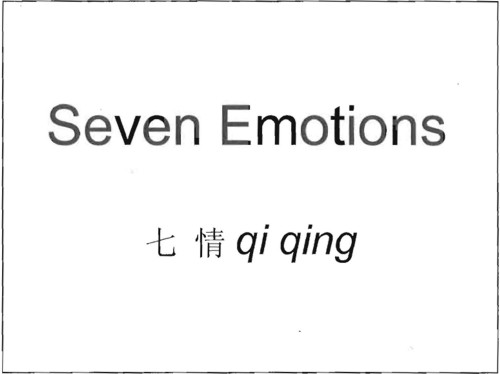
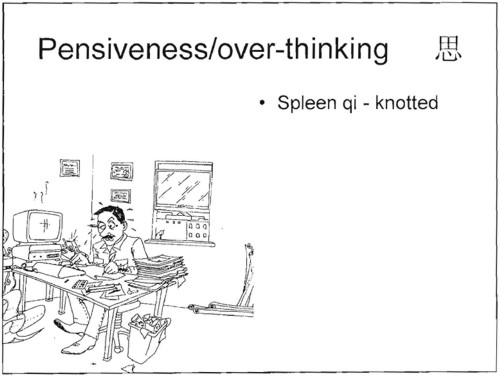
Uhuh, my spleen qi is well and truly knotted already though when I learned physiology it was not thought that the spleen had much to do with emotions.
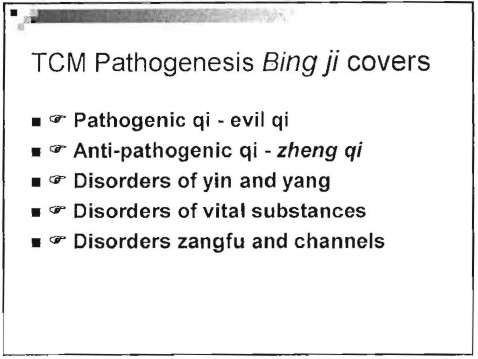
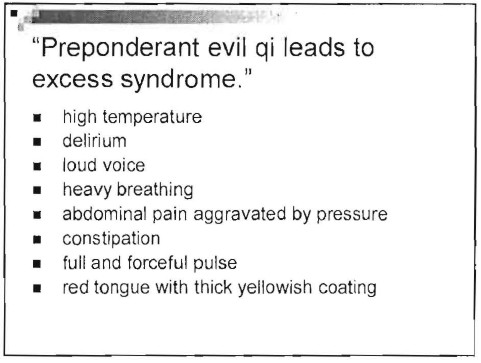
Ah so at least the problem of heavy breathers is solved. But high temperature, abdominal pain and abnormal pulse can be signs of serious illness. If your only explanation for them is “preponderant evil Qi”, you are a menace to public health.
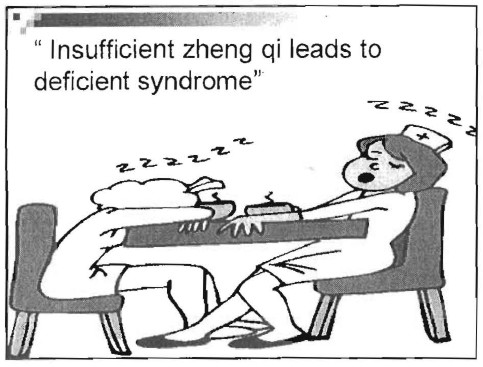
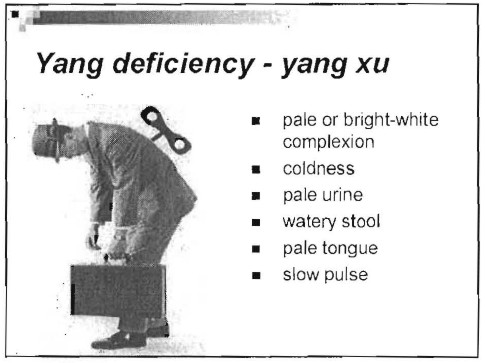
All these symptoms could be the result of a serious disease. It is not only antiquated nonsense to talk about them in terms of Yin, Yang and Qi. It endangers people,
Course CMH 2212
Chinese materia medica. Some of the herbs are likely to contain active ingredients (indeed some are very dangerous). It would be quite possible to study the ingredients of these herbs and to investigate how they work in the light of what has been learned about physiology and pharmacology in the last 200 years. Pharmacology has a long history of doing that, But is seems to play no part in this course. Herbs are “cold” or “hot” and may “check the exuberance of yang”.
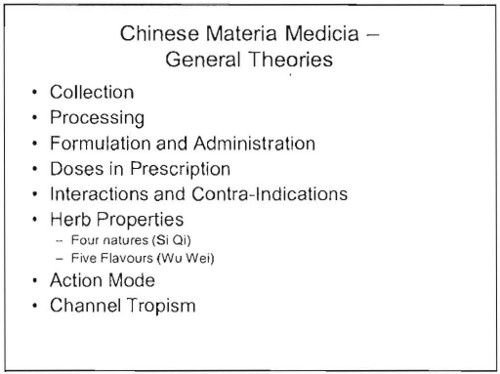
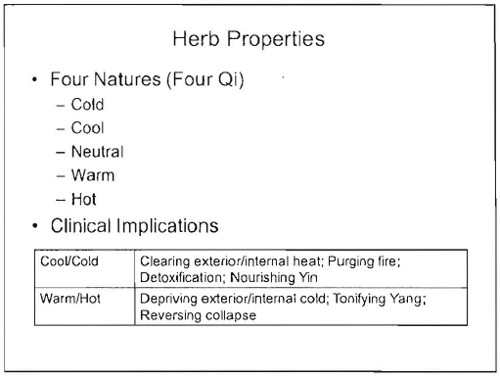
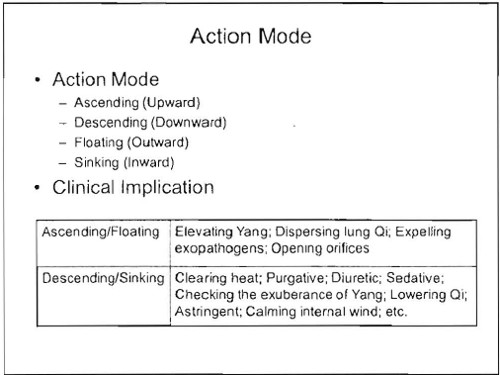
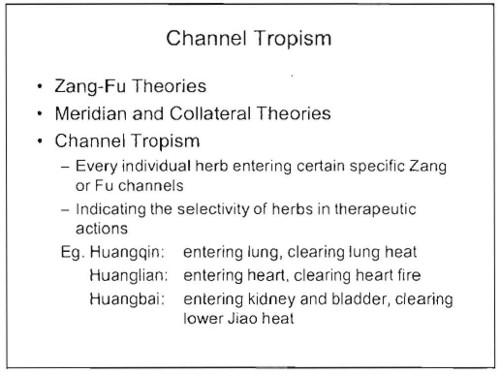
and so on, just preposterous, made-up nonsense from another era.
If it were taught as cultural history, it might be interesting. But it is being taught as though it were true, and an appropriate way to treat sick people.
Course CMH 3214
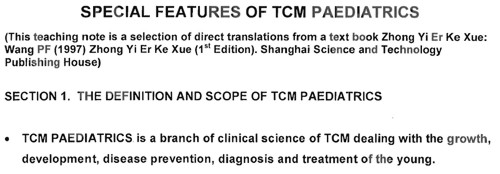


Would you trust your child to someone who’d been taught that “causes of paediatric diseases are relatively simple”, and “children are pure yang”?
Now some Chinese recipes
Course CMH 3100
![]()

This may or may not taste good, but to recommend it for diabetes is seriously irresponsible.

The programme specification for the “BSc (Hons) Traditonal Chinese medicine” can be found here. [local copy download]
It is written with all the official trappings, just as though the degree was about science. It isn’t. It is a danger to public health.
I have asked the vice-chancellor, Michael Driscoll, to express his view of these comments
Follow-up
A rather unexpected comment from a London acupuncturist.
“At least,I knew that Professor David Colquhoun is very skeptical about Chinese medicine. he comment Chinese medicine study”not only are the ideas absurd, pre-scientific, indeed antiscientific. They are also dangerous. People who have been taught this nonsense are going out and being let loose on sick people.” “
“But,I still like to read his blog as His article very is respectable. I think. Look this…”
The skeptic blog featured this post in its weekly roundup.
27 May 2010. Times Higher Education reported the decision of Middlesex University to close its philosophy department. This department seems to have a remarkable reputation, not least for a post-1992 university. Three academics and four students have been suspended and gagged in classical bullying style.
This has happened while they continue to teach dangerous rubbish like that described above.
I left a comment at Times Higher, as follows.
It is a reflection on the quality of university management that Middlesex has chosen to shut its philosophy department while continuing to run degrees in quackery. These courses not only offer an Hons BSc for memorising chunks of anti-scientific nonsense. They also pose a real danger to patients. See https://www.dcscience.net/?p=2923
I can think of no better illustration than this of the crass nature of the judgements made by Middlesex’s management. They are either ignorant of what constitutes science, or they are corrupt. I see no other possibilities. In either case they should not be running a university.
I think Prof Michael Driscoll owes the world an explanation.
Yet another university has stopped its homeopathy course. The particular interest of this course was that it was being run at Robert Gordon University, Aberdeen, the vice-chancellor which was Michael Pittilo, until his recent premature death. Pittilo is the person who recommended to the government that herbalists and Chinese medicine practitioners should get honours degrees and be regulated like doctors. His report, was, in my opinions, disastrously bad.
It recently emerged that this, very bad, advice would not be accepted by the Department of Health (DH), so the campaign against the Pittilo proposals, on this blog and elsewhere was successful. The alternative DH proposals look pretty silly, but we won’t really know until after the election exactly what will happen.
Robert Gordon University (RGU): is the ‘post-1992’ university in Aberdeen, as opposed the the University of Aberdeen (where my son is at the moment). Much of RGU does an excellent job, but like so many post-1992 universities they harm themselves by running courses in barmy alternative medicine. RGU ran an Introduction To Homeopathy module (saved 9 April 2010).
In July 2009, I asked RGU to see some samples of the teaching materials on this module, partly as part of the campaign against Pittilo’s proposals. I asked to see the powerpoints and handouts for three lectures, (1) evidence for homeopathy, (2) first aid remedies, and (3) allergies.
In September 2009, this request, made under the Freedom of Information Act (Scotland), was, as always, rejected by RGU, though they did tell me that the evidence lecture had been produced by a lecturer from The Faculty of Homeopathy and the other two had been produced by a local GP.
So, as usual, I asked for the mandatory internal review of the decision. In October, the review upheld the original decision, as they almost always do. I referred the decision to the Scottish Information Commissioner (the law is slightly different in Scotland) and they have still not responded.
But on 8 April 2010 I got a letter from RGU.
|
“The above course requested is no longer part of the School of Nursing and Midwifery’s provision, and it was cessated [sic] in Semester One 2009/10. This followed a formal review of all Nursing and Midwifery modules and their viability. In the light of this the university has decided to release the information.” |
So yet another university has done the sensible thing. The course has been shut. Just for the record, I’ll reproduce a few of the slides from the lecture on “homeopathic remedies for allergies”.
Allergies can be dangerous, and occasionally lethal. To treat them with homeopathic pills, medicines that contain no medicine, is not just delusion, but a dangerous delusion which risks the lives of patients.
The "remedies" include nettles, sulphur, petroleum and arsenic. They’d be pretty scary but in fact the pills contain, in most cases, not a jot of nettle, sulphur, petroleum or arsenic. Homeopathic pharmacies stock thousands of bottles of identical sugar pills, each with a different label.
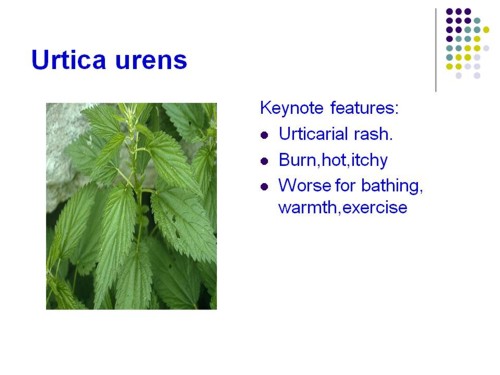
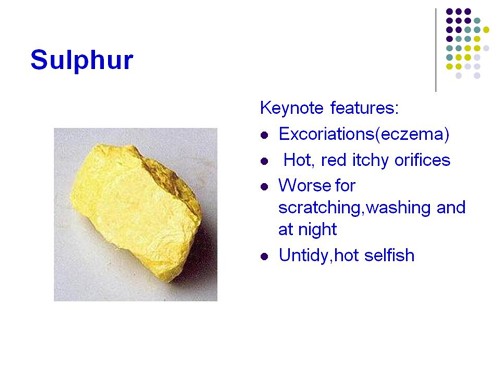

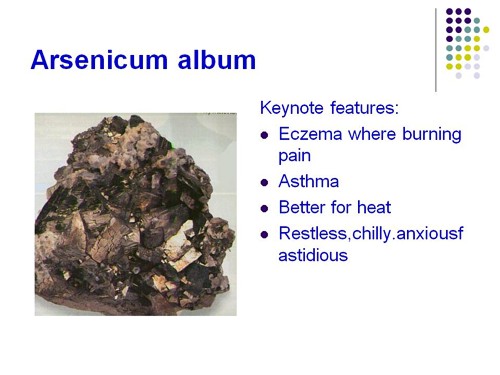
These dangerous delusions were being taught as fact in a UK university. The shame of it..
This post recounts a complicated story that started in January 2009, but has recently come to what looks like a happy ending. The story involves over a year’s writing of letters and meetings, but for those not interested in the details, I’ll start with a synopsis.
Synopsis of the synopsis
In January 2009, a course in "integrated medicine" was announced that, it was said, would be accredited by the University of Buckingham. The course was to be led by Drs Rosy Daniel and Mark Atkinson. So I sent an assessment of Rosy Daniel’s claims to "heal" cancer to Buckingham’s VC (president), Terence Kealey, After meeting Karol Sikora and Rosy Daniel, I sent an analysis of the course tutors to Kealey who promptly demoted Daniel, and put Prof Andrew Miles in charge of the course. The course went ahead in September 2009. Despite Miles’ efforts, the content was found to be altogether too alternative. The University of Buckingham has now terminated its contract with the "Faculty of Integrated Medicine", and the course will close. Well done.Buckingham.
Synopsis
- January 2009. I saw an announcement of a Diploma in Integrated Medicine, to be accredited by the University of Buckingham (UB). The course was to be run by Drs Rosy Daniel and Mark Atkinson of the College of Integrated Medicine, under the nominal directorship of Karol Sikora (UB’s Dean of Medicine). I wrote to Buckingham’s vice-chancellor (president), Terence Kealey, and attached a reprint of Ernst’s paper on carctol, a herbal cancer ‘remedy’ favoured by Daniiel.
- Unlike most vice-chancellors, Kealey replied at once and asked me to meet Sikora and Daniel. I met first Sikora alone, and then, on March 19 2009, both together. Rosy Daniel gave me a complete list of the speakers she’d chosen. Most were well-known alternative people, some, in my view, the worst sort of quack. After discovering who was to teach on the proposed course, I wrote a long document about the proposed speakers and sent it to the vice-chancellor of the University of Buckingham, Terence Kealey on March 23rd 2009.. Unlike most VCs, he took it seriously. At the end of this meeting I asked Sikora, who was in nominal charge of the course, how many of the proposed tutors he’d heard of. The answer was "none of them"
- Shortly before this meeting, I submitted a complaint to Trading Standards about Rosy Daniel’s commercial site, HealthCreation, for what seemed to me to be breaches of the Cancer Act 1939, by claims made for Carctol. Read the complaint.
- On 27th April 2009, I heard from Kealey that he’d demoted Rosy Daniel from being in charge of the Diploma and appointed Andrew Miles, who had recently been appointed as Buckingham’s Professor of Public Health Education and Policy &Associate Dean of Medicine (Public Health). Terence Kealey said "You’ve done us a good turn, and I’m grateful". Much appreciated. Miles said the course “needs in my view a fundamental reform of content. . . “
- Although Rosy Daniel had been demoted, she was still in charge of delivering the course at what had, by this time, changed its name to the Faculty of Integrated Medicine which, despite its name, is not part of the university.
- Throughout the summer I met Miles (of whom more below) several times and exchanged countless emails, but still didn’t get the revised list of speakers. The course went ahead on 30 September 2009. He also talked with Michael Baum and Edzard Ernst.
- By January 2010, Miles came to accept that the course was too high on quackery to be a credit to the university, and simply fired The Faculty of Integrated Medicine. Their contract was not renewed. Inspection of the speakers, even after revision of the course, shows why.
- As a consequence, it is rumoured that Daniel is trying to sell the course to someone else. The University of Middlesex, and unbelievably, the University of Bristol, have been mentioned, as well as Thames Valley University, the University of Westminster, the University of Southampton and the University of East London. Will the VCs of these institutions not learn something from Buckingham’s experience? It is to be hoped that they would at the very least approach Buckingham to ask pertinent questions? But perhaps a more likely contender for an organisation with sufficient gullibility is the Prince of Wales newly announced College of Integrated Medicine. [but see stop press]
The details of the story
The University of Buckingham (UB) is the only private university in the UK. Recently it announced its intention to start a school of medicine (the undergraduate component is due to start in September 2011). The dean of the new school is Karol Sikora.
Karol Sikora shot to fame after he appeared in a commercial in the USA. The TV commercial was sponsored by a far-right Republican campaign group, “Conservatives for Patients’ Rights” It designed to prevent the election of Barack Obama, by pouring scorn on the National Health Serrvice. A very curious performance. Very curious indeed. And then there was a bit of disagreement about the titles that he claimed to have.
As well as being dean of medicine at UB. Karol Sikora is also medical research director of CancerPartnersUK. a private cancer treatment company. He must be a very busy man.
Karol Sikora’s attitude to quackery is a mystery wrapped in an enigma. As well as being a regular oncologist, he is also a Foundation Fellow of that well known source of unreliable information, The Prince of Wales Foundation for Integrated Health. He spoke at their 2009 conference.
In the light of that, perhaps it is not, after all, so surprising thet the first action of UB’s medical school was to accredit a course a Diploma in Integrated Medicine. This course has been through two incarnations. The first prospectus (created 21 January 2009) advertised the course as being run by the British College of Integrated Medicine.But by the time that UB issued a press release in July 2009, the accredited outfit had changed its name to the Faculty of Integrated Medicine That grand title makes it sound like part of a university. It isn’t.
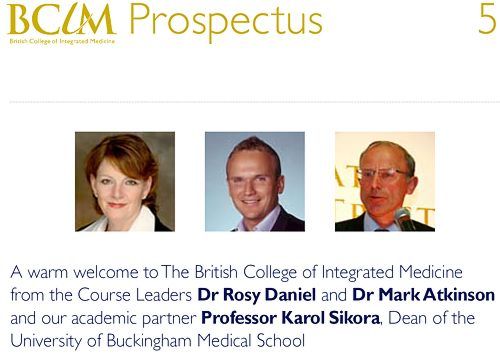
Rosy Daniel runs a company, Health Creation which, among other things, recommended a herbal concoction. Carctol. to "heal" cancer, . I wrote to Buckingham’s vice-chancellor (president), Terence Kealey, and attached a reprint of Ernst’s paper on Carctol. . Unlike most university vice-chancellors, he took it seriously. He asked me to meet Karol Sikora and Rosy Daniel to discuss it. After discovering who was teaching on this course, I wrote a document about their backgrounds and sent it to Terence Kealey. The outcome was that he removed Rosy Daniel as course director and appointed in her place Andrew Miles, with a brief to reorganise the course. A new prospectus, dated 4 September 2009, appeared. The course is not changed as much as I’d have hoped, although Miles assures me that while the lecture titles themselves may not have changed, he had ordered fundamental revisions to the teaching content and the teaching emphases.
In the new prospectus the British College of Integrated Medicine has been renamed as the Faculty of Integrated Medicine, but it appears to be otherwise unchanged. That’s a smart bit of PR. The word : “Faculty” makes it sound as though the college is part of a university. It isn’t. The "Faculty" occupies some space in the Apthorp Centre in Bath, which houses, among other things, Chiropract, Craniopathy (!) and a holistic vet,
The prospectus now starts thus.
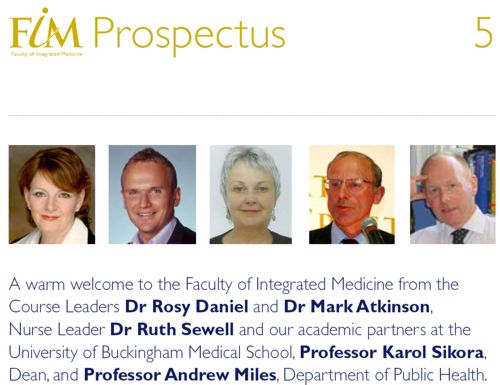
The Advisory Board consists largely of well-know advocates of alternative medicine (more information about them below).
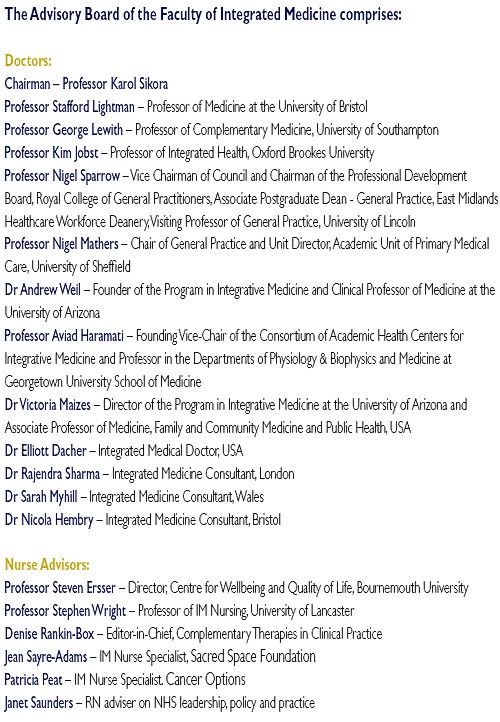
Most of these advisory board members are the usual promoters of magic medicine. But three of them seem quite surprising,Stafford Lightman, Nigel Sparrow and Nigel Mathers.
Stafford Lightman? Well actually I mentioned to him in April that his name was there and he asked for it to be removed, on the grounds that he’d had nothing to do with the course. It wasn’t removed for quite a while, but the current advisory board has none of these people. Nigel Sparrow and Nigel Mathers, as well as Lightman, sent letters of formal complaint to Miles and Terence Kealey, the VC of Buckingham, to complain that their involvement in Rosy Daniel’s set-up had been fundamentally misrepresented by Daniel. With these good scientists having extricated themselves from Daniel’s organisation, the FIM has only people who are firmly in the alternative camp (or quackery, as i’d prefer to call it). For example, people like Andrew Weil and George Lewith.
Andrew Weil, for example, while giving his address as the University of Arizona, is primarily a supplement salesman. He was recently reprimanded by the US Food and Drugs Administration
“Advertising on the site, the agencies said in the Oct. 15 letter, says “Dr. Weil’s Immune Support Formula can help maintain a strong defense against the flu” and claims it has “demonstrated both antiviral and immune-boosting effects in scientific investigation.”
The claims are not true, the letter said, noting the “product has not been approved, cleared, or otherwise authorized by FDA for use in the diagnosis, mitigation, prevention, treatment, or cure of the H1N1 flu virus.”
This isn’t the first time I’ve come across people’s names being used to support alternative medicine without the consent of the alleged supporter. There was, for example, the strange case of Dr John Marks and Patrick Holford.
Misrepresentation of this nature seems to be the order of the day. Could it be that people like Rosy Daniel are so insecure or, indeed, so unimportant within the Academy in real terms (where is there evidence of her objective scholarly or clinical stature?), that they seek to attach themselves, rather like limpets to fishing boats, to people of real stature and reputation, in order to boost their own or others’ view of themselves by a manner of proxy?
The background
When the course was originally proposed, a brochure appeared. It said accreditation by the University of Buckingham was expected soon.
Not much detail appeared in the brochure, Fine words are easy to write but what matters is who is doing th teaching. So I wrote to the vice-chancellor of Buckingham, Terence Kealey. I attached a reprint of Ernst’s paper on carctol, a herbal cancer ‘remedy’ favoured by Daniel (download the cached version of her claims, now deleted).
Terence Kealey
Kealey is regarded in much of academia as a far-right maverick, because he advocates ideas such as science research should get no public funding,and that universities should charge full whack for student fees. He has, in fact, publicly welcomed the horrific cuts being imposed on the Academy by Lord Mandelson. His piece in The Times started
“Wonderful news. The Government yesterday cut half a billion pounds from the money it gives to universities”
though the first comment on it starts
"Considerable accomplishment: to pack all these logical fallacies and bad metaphors in only 400 words"
He and I are probably at opposite ends of the political spectrum. Yet he is the only VC who has been willing to talk about questions like this. Normally letters to vice-chancellors about junk degrees go unanswered. Not so with Kealey. I may disagree with a lot of his ideas, but he is certainly someone you can do business with.
Kealey responded quickly to my letter, sent in January 2009, pointing out that Rosy Daniel’s claims about Carctol could not be supported and were possibly illegal. He asked me to meet Sikora and Daniel. I met first Sikora alone, and then, on March 19 2009, both together. Rosy Daniel gave me a complete list of the speakers she’d chosen to teach on this new Diploma on IM.
After discovering who was to teach on the proposed course, I wrote a long document about the proposed speakers and sent it to Terence Kealey on March 23rd 2009. It contained many names that will be familiar to anyone who has taken an interest in crackpot medicine, combined with a surprisingly large element of vested financial interests. Unlike most VCs, Kealey took it seriously.
The remarkable thing about this meeting was that I asked Sikora how many names where familiar to him on the list of people who had been chosen by Rosy Daniel to teach on the course. His answer was "none of them". Since his name and picture feature in all the course descriptions, this seemed like dereliction of duty to me.
After seeing my analysis of the speakers, Terence Kealey reacted with admirable speed. He withdrew the original brochure, demoted Rosy Daniel (in principle anyway) and brought in Prof Andrew Miles to take responsibility for the course. This meant that he had to investigate the multiple conflicts of interests of the various speakers and to establish some sort of way forward in the ‘mess’ of what had been agreed before Miles’ appointment to Buckingham
Andrew Miles.
Miles is an interesting character, a postdoctoral neuroendocrinologist, turned public health scientist. I’d come across him before as editor-in-chief of the Journal of Evaluation in Clinical Practice This is a curious journal that is devoted mainly to condemning Evidence Based Medicine. Much of its content seems to be in a style that I can only describe as post-modernist-influenced libertarian.
The argument turns on what you mean by ‘evidence’ and, in my opinion, Miles underestimates greatly the crucial problem of causality, a problem that can be solved only by randomisation, His recent views on the topic can be read here.
An article in Miles’ journal gives its flavour: "Andrew Miles, Michael Loughlin and Andreas Polychronis, Medicine and evidence: knowledge and action in clinical practice". Journal of Evaluation in Clinical Practice 2007, 13, 481–503 [download pdf]. This paper launches an attack on Ben Goldacre, in the following passage.
“Loughlin identifies Goldacre [36] as a particularly luminous example of a commentator who is able not only to combine audacity with outrage, but who in a very real way succeeds in manufacturing a sense of having been personally offended by the article in question. Such moralistic posturing acts as a defence mechanism to protect cherished assumptions from rational scrutiny and indeed to enable adherents to appropriate the ‘moral high ground’, as well as the language of ‘reason’ and ‘science’ as the exclusive property of their own favoured approaches. Loughlin brings out the Orwellian nature of this manoeuvre and identifies a significant implication.”
"If Goldacre and others really are engaged in posturing then their primary offence, at least according to the Sartrean perspective adopted by Murray et al. is not primarily intellectual, but rather it is moral. Far from there being a moral requirement to ‘bend a knee’ at the EBM altar, to do so is to violate one’s primary duty as an autonomous being.”
This attack on one of my heroes was occasioned because he featured one of the most absurd pieces of post-modernist bollocks ever, in his Guardian column in 2006. I had a go at the same paper on this blog, as well as an earlier one by Christine Barry, along the same lines. There was some hilarious follow-up on badscience.net. After this, it is understandable that I had not conceived a high opinion of Andrew Miles. I feared that Kealey might have been jumping out of the frying pan into the fire.
After closer acquaintance I have changed my mind, In the present saga Andrew Miles has done an excellent job. He started of sending me links to heaven knows how many papers on medical epistemology, to Papal Encyclicals on the proposed relationship between Faith and Reason and on more than one occasion articles from the Catholic Herald (yes, I did read it). This is not entirely surprising, as Miles is a Catholic priest as well as a public health academic, so has two axes to grind. But after six months of talking, he now sends me links to junk science sites of the sort that I might get from, ahem, Ben Goldacre.
Teachers on the course
Despite Andrew Miles best efforts, he came in too late to prevent much of the teaching being done in the parallel universe of alternative medicine, The University of Buckingham had a pre-Miles, legally-binding contract (now terminated) with the Faculty of Integrated Medicine, and the latter is run by Dr Rosy Daniel and Dr Mark Atkinson. Let’s take a look at their record.
Rosy Daniel BSc, MBBCh
Dr Rosy Daniel first came to my attention through her commercial web site, Health Creation. This site, among other things, promoted an untested herbal concoction, Carctol, for "healing" cancer.
Carctol: Profit before Patients? is a review by Edzard Ernst of the literature, such as it is, and concludes
Carctol and the media hype surrounding it must have given many cancer patients hope. The question is whether this is a good or a bad thing. On the one hand, all good clinicians should inspire their patients with hope [6]. On the other hand, giving hope on false pretences is cruel and unethical. Rosy Daniel rightly points out that all science begins with observations [5]. But all science then swiftly moves on and tests hypotheses. In the case of Carctol, over 20 years of experience in India and almost one decade of experience in the UK should be ample time to do this. Yet, we still have no data. Even the small number of apparently spectacular cases observed by Dr. Daniel have not been published in the medical literature.
On this basis I referred Health Creation to Trading Standards officer for a prima facie breach of the Cancer Act 1939. ]Download the complaint document]. Although no prosecution was brought by Trading Standards, they did request changes in the claims that were being made. Here is an example.
A Google search of the Health Creation site for “Carctol” gives a link
Dr Daniel has prescribed Carctol for years and now feels she is seeing a breakthrough. Dr Daniel now wants scientists to research the new herbal medicine
But going to the link produces
Access denied.
You are not authorized to access this page.
You can download the cached version of this page, which shows the sort of claims that were being made before Trading Standards Officers stepped in. There are now only a few oblique references to Carctol on the Health Creation site, e.g. here..
Both Rosy Daniel and Karol Sikora were speakers at the 2009 Princes’s Foundation Conference, in some odd company.
Mark Atkinson MBBS BSc (Hons) FRIPH
Dr Mark Atkinson is co-leader of the FiM course. He is also a supplement salesman, and he has promoted the Q-link pendant. The Q-link pendant is a simple and obvious fraud designed to exploit paranoia about WiFi killing you. When Ben Goldacre bought one and opened it. He found
“No microchip. A coil connected to nothing. And a zero-ohm resistor, which costs half a penny, and is connected to nothing.”
Nevertheless, Mark Atkinson has waxed lyrical about this component-free device.
“As someone who used to get tired sitting in front of computers and used to worry about the detrimental effects of external EMF’s, particularly as an avid user of mobile phones, I decided to research the various devices and technologies on the market that claim to strengthen the body’s subtle energy fields. It was Q Link that came out top. As a Q link wearer, I no longer get tired whilst at my computer, plus I’m enjoying noticeably higher energy levels and improved mental performance as a result of wearing my Q Link. I highly recommend it.” Dr Mark Atkinson, Holistic Medical Physician
Mark Atkinson is also a fan of Emo-trance. He wrote, In Now Magazine,
"I wanted you to know that of all the therapies I’ve trained in and approaches that I have used (and there’s been a lot) none have excited me and touched me so deeply than Emotrance."
"Silvia Hartmann’s technique is based on focusing your thoughts on parts of your body and guiding energy. It can be used for everything from insomnia to stress. The good news is that EmoTrance shows you how to free yourself from these stuck emotions and release the considerable amounts of energy that are lost to them."
Aha so this particular form of psychobabble is the invention of Silvia Hartmann. Silvia Hartmann came to my attention because her works feature heavily in on of the University of Westminster’s barmier “BSc” degrees, in ‘naturopaths’, described here. She is fanous, apart from Emo-trance, for her book Magic, Spells and Potions
“Dr Hartmann has created techniques that will finally make magic work for you in ways you never believed to be possible.”
Times Higher Education printed a piece with the title ‘Energy therapy’ project in school denounced as ‘psychobabble’. They’d phoned me a couple of days earlier to see whether I had an opinion about “Emotrance”. As it happens, I knew a bit about it because it had cropped up in a course given at, guess where, the University of Westminster . It seems that a secondary school had bought this extreme form of psychobabble. The comments on the Times Higher piece were unusually long and interesting.
It turned out that the inventor of “Emotrance”, Dr Silvia Hartmann PhD., not only wrote books about magic spells and potions, but also that her much vaunted doctorate had been bought from the Universal Life Church, current cost $29.99.
The rest of the teachers
The rest of the teachers on the course, despite valiant attempts at vetting by Andrew Miles, includes many names only too well-known to anybody who has taken and interest in pseudo-scientific medicine. Here are some of them.
Damien Downing:, even the Daily Mail sees through him. Enough said.
Kim Jobst, homoepath and endorser of the obviously fraudulent Q-link
pendant. His Plaxo profile says
About Kim A. Jobst
Consultant, Wholystic Care Physician [sic!] , Medical Homoeopath, Specialist in Neurodegeneration and Dementia, using food state nutrition, diet and lifestyle to facilitate Healing and Growth;
Catherine Zollman, Well known ally of HRH and purveyer of woo.
Harald Walach, another homeopath, fond of talking nonsense about "quantum effects".
Nicola Hembry, a make-believe nutritionist and advocate of vitamin C and laetrile for cancer
Simon Mills, a herbalist who is inclined to diagnoses like “hot damp”, ro be treated with herbs that tend to “cool and dry.”
David Peters, of the University of Westminster. Enough said.
Nicola Robinson of Thames Valley University. Advocate of unevidenced treatmsnts.
Michael Dixon, of whom more here.
And last but not least,
Karol Sikora.
The University of Buckingham removes accreditation of the Faculty of Integrated Medicine
The correspondence has been long and, at times, quite blunt. Here are a few quotations from it, The University of Buckingham, being private, is exempt from the Freedom of Information Act (2000) but nevertheless they have allowed me to reproduce the whole of the correspondence. The University, through its VC, Terence Keeley, has been far more open than places that are in principle subject to FOIA, but which, in practice, always try to conceal material. I may post the lot, as time permits, but meanwhile here are some extracts. They make uncomfortable reading for advocates of magic medicine.
Miles to Daniel, 8 Dec 2009
” . . . now that the University has taken his [Sikora’s] initial advice in trialing the DipSIM and has found it cost-ineffective, the way forward is therefore to alter that equation through more realistic financial contribution from IHT/FIM at Bath or to view the DipSIM as an experiment that has failed and which must give way to other more viable initiatives."
"The University is also able to confirm that we hold no interest in jointly developing any higher degrees on the study of IM with IHT/FIM at Bath. This is primarily because we are developing our own Master’s degree in Medicine of the Person in collaboration with various leading international societies and scholars including the WHO and which is based on a different school of thought. "
Miles to Daniel 15 Dec 2009
"Dear Rosy
It appears that you have not fully assimilated the content of my earlier e-mails and so I will reiterate the points I have already made to you and add to them.
The DipSIM is an external activity – in fact, it is an external collaboration and nothing more. It is not an internal activity and neither is it in any way part of the medical school and neither will it become so and so the ‘normal rules’ of academic engagement and scholarly interchange do not apply. Your status is one of external collaborator and not one of internal or even visiting academic colleague. There is no “joint pursuit” of an academically rigorous study of IM by UB and IHT/FIM beyond the DipSIM and there are no plans, and never have been, for the “joint definition of research priorities” in IM. The DipSIM has been instituted on a trial basis and this has so far shown the DipSIM to be profoundly cost-ineffective for the University. You appear to misunderstand this – deliberately or otherwise."
Daniel to Miles 13 Jan 2010
"However, I am aware that weather permitting you and Karol will be off to the Fellows meeting for the newly forming National College (for which role I nominated you to Dr Michael Dixon and Prof David Peters.)
I have been in dialogue with Michael and Boo Armstrong from FIH and they are strongly in favour of forming a partnership with FIM so that we effectively become one of many new faculties within the College (which is why we change our name to FIM some months ago).
I have told Michael about the difficulties we are having and he sincerely hopes that we can resolve them so that we can all move forward as one. "
Miles to Daniel 20 Jan 2010
"Congratulations on the likely integration of your organisation into the new College of Integrative Health which will develop out of the Prince’s Foundation for Integrated Health. This
will make an entirely appropriate home for you for the longer term.Your image of David Colquhoun "alive and kicking" as the Inquisitor General, radiating old persecutory energy and believing "priestess healers" (such as you describe youself) to be best "tortured, drowned and even burnt alive", will remain with me, I suspect, for many years to come (!). But then, as the Inquisitor General did say, ‘better to burn in this life than in the next’ (!). Overall, then, I reject your conclusion on the nature of the basis of my decision making and playfully suggest that it might form part of the next edition of Frankfurt’s recent volume ["On Bullshit] http://press.princeton.edu/titles/7929.html I hope you will forgive my injection of a little academic humour in an otherwise formal and entirely serious communication.
The nature of IM, with its foundational philosophy so vigorously opposed by mainstream medicine and the conitnuing national and international controversies which engulf homeopaths, acupuncturists, herbalists, naturopaths, transcendental meditators, therapeutic touchers, massagers, reflexologists, chiropractors, hypnotists, crystal users, yoga practitioners, aromatherapists, energy channelers, chinese medicine practitioners et al, can only bring the University difficulties as we seek to establish a formal and internationally recognised School of Medicine and School of Nursing.
I do not believe my comments in relation to governance at Bath are "offensive". They are, on the contrary, entirely accurate and of concern to the University. There have been resignations at senior level from your Board due to misrepresentation of your position and there has been a Trading Standards Authority investigation into further instances of misrepresentation. I am advised that an audit is underway of your compliance with the Authority’s instructions. You have therefore not dealt with my concerns, you have merely described them as "offensive".
I note from your e-mail that you are now in discussions with other universities and given the specific concerns of the University of Buckingham which I have dealt with exhaustively in this and other correspondences and the incompatibility of the developments at UB with the DipSIM and your own personal ambitions, etc., I believe you to have taken a very wise course and I wish you well in your negotiations. In these circumstances I feel it appropriate to enhance those negotiations by confirming that the University of Buckingham will not authorise the intake of a second cohort of students and that the relationship between IHT and the University will cease following the graduation of those members of the current course that are successful in their studies – the end of February 2011."
From Miles 2 Feb 2010
"Here is the list of teachers – you can subtract me (I withdrew from teaching when the antics ay Bath started) and also Professor John Cox (Former President of The Royal College of Psychiatrists and Former Secretary General of the World Psychiatric Association) who withdrew when he learned of some of the stuff going on…. Karol Sikora continues to teach. Michael Loughlin and Carmel Martin are both good colleagues of mine and, I can assure you – taught the students solid stuff! Michael taught medical epistemology and Carmel the emerging field of systems complexity in health services (Both of them have now withdrawn from teaching commitments).
The tutors shown are described by Rosy as the finest minds in IM teaching in the country. I interviewed tham all personally on (a) the basis of an updated CV & (b) via a 30 min telephone interview with me personally. Some were excluded from teaching because they were not qualified to do so academically (e.g. Boo Armstrong, Richard Falmer, not even a first degree, etc, etc., but gave a short presentation in a session presided over by an approved teacher) and others were approved because of their academic qualifications, PhD, MD, FRCP etc etc etc) and activity within the IM field. Each approved teacher was issued with highly specific teaching guidance form me (no bias, reference to opposing schools of thought, etc etc) and each teacher was required to complete and sign a Conflicts of Interest form. All of these documentations are with me here. Short of all this governance it’s impossible to bar them from teaching because who else would then do it?! Anyway, the end is in sight – Hallelujah! "
From Miles 19 Feb 2010
"Dear David
Just got back to the office after an excellent planning meeting for the new Master’s Degree in Person-centred Medicine and a hearty (+ alcoholic) lunch at the Ath! Since I shall never be a FRS, the Ath seems to me the next best ‘club’ (!). Michael Baum is part of the steering committee and you might like to take his thoughts on the direction of the programme. Our plans may even find their way into your Blog as an example of how to do things (vs how not to do things, i.e. CAM, IM, etc!). This new degree will sit well alongside the new degrees in Public Health – i.e. the population/utilitarian outlook of PH versus the individual person-centred approach., etc. "
And an email from a senior UB spokesperson
"Rumour has it that now that Buckingham has dismissed the ‘priestess healer of Bath’, RD [Rosy Daniel] , explorations are taking place with other universities, most of which are subject to FoI request from DC at the time of writing. Will these institutions have to make the same mistakes Buckingham did before taking the same action? Rumour also has it that RD changed the name of her institution to FIM in order to fit neatly into the Prince’s FIH, a way, no doubt, of achieving ‘protection’ and ‘accreditation’ in parallel with particularly lucrative IM ‘education’ (At £9,000 a student and with RD’s initial course attracting 20 mainly GPs, that’s £180,00 – not bad business…. And Buckingham’s ‘share of this? £12,000!”
The final bombshell; even the Prince of Wales’ FIH rejects Daniel and Atkinson?
Only today (31 March) I was sent, from a source that I can’t reveal, an email which comes from someone who "represent the College and FIH . . . ".. This makes it clear that the letter comes from the Prince of Wales’ Foundation for Integrated Health
|
Dr Rosy Daniel BSc MBBCh Director of the Faculty of Integrated Medicine Medical Director Health Creation 30th March 2010 RE: Your discussion paper and recent correspondence Thank you for meeting with [XXXXXX] and myself this evening to discuss your proposals concerning a future relationship between your Faculty of Integrated Medicine and the new College. As you know, he and I have been asked to represent the College and FIH in this matter. We are aware of difficulties facing your organisations and the FIM DipSIM course. As a consequence of these, it is not possible for the College to enter into an association with you, any of your organisations nor the DipSIM course at the present time. It would, therefore, be wrong to represent to others that any such association has been agreed. You will appreciate that, in these circumstances, you will not receive an invitation to the meeting of 15th April 2010 nor to other planned events. I am sorry to disappoint you in this matter. Yours sincerely |
Conclusions
I’ll confess to feeling almost a little guilty for having appeared to persecute the particular individuals involved in thie episode. But patients are involved and so is the law, and both of these are more important than individuals, The only unfair aspect is that, while it seems that even the Prince of Wales’ Foundation for Integrated Health has rejected Daniel and Atkinson, that Foundation embraces plenty of people who are just as deluded, and potentially dangerous, as those two. The answer to that problem is for the Prince to stop endorsing treatments that don’t work.
As for the University of Buckingham. Well, despite the ‘right wing maverick’ Kealey and the ‘anti-evidence’ Miles, I really think they’ve done the right thing. They’ve listened, they’ve maintained academic rigour and they’ve released all information for which I asked and a lot more. Good for them, I say.
Follow-up
15 April 2010. This story was reported by Times Higher Education, under the title “It’s terminal for integrated medicine diploma“. That report didn’t attract comments. But on 25th April Dr Rosy Daniel replied with “‘Terminal’? We’ve only just begun“. This time there were some feisty responses. Dr Daniel really should check her facts before getting into print.
3 March 2011. Unsurprisingly, Dr Daniel is up and running again, under the name of the British College of Integrated Medicine. The only change seems to be that Mark Atkinson has jumped ship altogether, and, of course, she is now unable to claim endorsement by Buckingham, or any other university. Sadly, though, Karol Sikora seems to have learned nothing from the saga related above. He is still there as chair of the Medical Advisory Board, along with the usual suspects mentioned above.
Malaria in the news, yet again.
Today I had a not-very-friendly letter from Kate Birch
|
From: kate birch <katebhom@hotmail.com> As I said we keep on working. while you and your kangaroo committee put on a good show. Try to take this one to the cleaners and more and more people will begin to see the fools that you really are. I hope western medicine saved you for your health crisis but that maybe when you depart you will see the how your bitterness twisted things and made you suffer so. |
You may recall the expose in which homeopaths in the UK were caught, in 2006, recommending their sugar pills for prevention of malaria, Lethal advice from homeopaths about malaria prevention
You may remember the saga of the taking down of Andy Lewis’s classic post in 2007 on The Gentle Art of Homeopathic Killing
Despite all this, in 2008, the trendy Covent Garden company, Neal’s Yard, tried marketing a homeopathic malaria "remedy". The quackometer’s post Neal’s Yard Remedies Offers Lethal Homeopathic Malaria Advice is a corker. Under pressure they withdrew the “remedy” (see Neal’s Yard Ethical Bullshit Remedy . Eventually Neal’s Yard was censured by the MHRA ( Neal’s Yard Remedies ‘rapped by medicines regulator’ )
Then there was Kate Birch of the North American Society of Homeopaths, who advocates sugar pills for every disease under the sun (and follow-up to these claims). Memorably, she visited me in late 2007 and gave me a copy of her book. A visit from Kate Birch sitll comes top of the front page if you google ‘kate birch homeopath’.
Attached to the unfriendly letter was a web page from Abha Light. It is an advertisement for a homeopathic malaria treatment. As far as I can see, it doesn’t say anywhere what the “remedy” contains, but that doesn’t matter if, as in most homeopathic products, it contains nothing whatsoever.

This document contains a direct claim that the treatment "has been successfully been used to prevent and treat malaria . . ."

There follows more utter fantasy
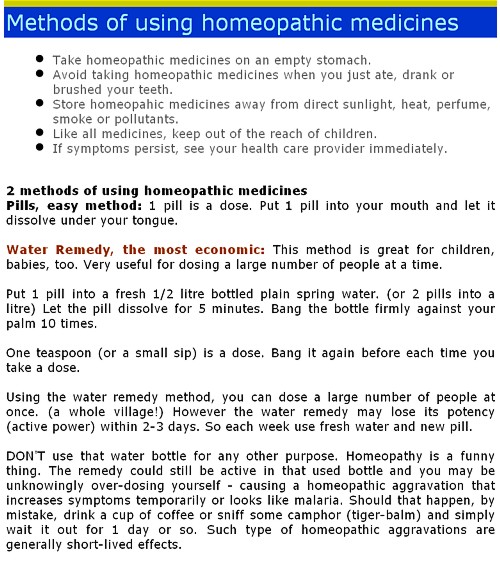
Nonsense like this would be a joke if it were not for the fact that they must be killing people.
Peter Fisher, clinical director the Royal London Homeopathic Hospital, said, of the original malaria scandal,
“I’m very angry about it because people are going to get malaria – there is absolutely no reason to think that homeopathy works to prevent malaria and you won’t find that in any textbook or journal of homeopathy so people will get malaria, people may even die of malaria if they follow this advice”
Like most quasi-religious subjects, homeopathy is split into sects, at war with each other.
Follow-up
Update 12 March. Six more dimwits signed.
An‘early day motion1 (EDM 908) has been tabled in parliament which opposes the conclusions of the science and technology committee report on the evidence for homeopathy. After two weeks it has been signed by an amazing 55 MPs. That is 8.5% of all 646 MPs. Nothing shows more clearly the scientific illiteracy that prevails in the House of Commons (and, perhaps, the results of the mass mailing of MPs by homeopaths, who are clutching at straws)..
These MPs are all people who have difficulty with the idea that pills which contain nothing can have no effect above placebo. It isn’t rocket science.
Those of us who spend quite a lot of unpaid time trying to communicate the joy of science to the public, rather resent having our efforts undermined by these members of parliament. But at least we now have a handy list of them.
In case this seems a bit harsh, it is only necessary to point out that the EDM was tabled by David Treddinick (Cons, Bosworth). Mr Treddinick is renowned as the most extreme advocate of magic medicine
in the House of Commons. The EDM twists and distorts the evidence in exactly the way the committee’s report condemned so sternly.
Nothing is too barmy for Treddinick to espouse. His education at Eton and Oxford has led him to advocate homeopathic borax for the treatment of foot and mouth disease, and he has backed homeopathic treatment of AIDS and malaria. He is a major danger to public health. By way of background, Tredinnick was suspended for a month without pay for taking a £1000 bribe in the cash for questions scandal. And he was again in trouble during the expenses scandal. It was reported that
“The MP for Bosworth struck a deal with the parliamentary standards commissioner to pay back the £755 which he claimed for a computer programme that states it can help users to predict their health via the stars.”
Yes, really, astrology! You couldn’t make it up.
One would think that, with a reputation like this, nobody with half a brain would want to sign an EDM proposed by Treddinick. Well, not so. The list of signatories is amazing, and shocking.
The state of the parties is interesting.
Unionists (Northern Ireland): no fewer than 77% (7 out of 9 MPs) signed, including the infamous Ian Paisley and the recently famous Peter Robinson. Disheartening though this is, perhaps it isn’t so surprising from a group noted for religious belief, and consequently predisposed to believing things that aren’t true.
The seriously sad thing is that second place in the stupid race is held by – wait for it – the Liberal Democrats, with 15.9% (10 of their 63 MPs). That is tragic in the light of the fact that two of the very few MPs in the House with any appreciation of evidence are also Lib Dems, Phil Willis and Evan Harris (both on the Science and Technology Committee).
After them Conservatives with 8.3% (16 out of 193), and the best is Labour 5.8% (20 out of 346 MPs)
Here is the roll of shame, updated on 12 March (the last six signed in the last 24 hours)
| Tredinnick, David | Con |
| Simpson, Alan | Lab |
| Russell, Bob | LibDem |
| Pound, Stephen | Lab |
| Dismore, Andrew | Lab |
| Simpson, David | Democratic unionist |
| McDonnell, John | Lab |
| Campbell, Gregory | Democratic unionist |
| Cohen, Harry | Lab |
| Corbyn, Jeremy | Lab |
| Drew, David | Lab |
| Gray, James | Con |
| Hancock, Mike | LibDem |
| Hermon, Lady | Ulster unionist |
| Key, Robert | Con |
| Hemming, John | LibDem |
| Bone, Peter | Con |
| Davies, Dai | Independent |
| Mates, Michael | Con |
| Dodds, Nigel | Democratic unionist |
| Wyatt, Derek | Lab |
| Sarwar, Mohammad | Lab |
| Hamilton, Fabian | Lab |
| Winterton, Nicholas | Con |
| Davies, Philip | Con |
| Leigh, Edward | Con |
| Barlow, Celia | Lab |
| Ellwood, Tobias | Con |
| Leech, John | Lib Dem |
| Main, Anne | Lab |
| Robinson, Peter | Democratic unionist |
| McCrea, Dr William | Democratic unionist |
| Paisley, Ian | Democratic unionist |
| Brady, Graham | Con |
| Cook, Frank | Lab |
| Hall, Patrick | Lab |
| Binley, Brian | Con |
| Pugh, John | Lib dem |
| Davey, Edward | Lib dem |
| Weir, Mike | Scottish Nationalist |
| Sharma, Virendra Kumar | Lab |
| Abbott, Diane | Lab |
| Williams, Mark | Lib dem |
| Horam, John | Con |
| Widdecombe, Ann | Con |
| Browne, Jeremy | Lib dem |
| Spicer, Michael | Con |
| Maclean, David | Con |
| McCafferty, Chris | Lab |
| Buck, Karen | Lab |
| George, Andrew | Lib Dem |
| Vis, Rudi | Lab |
| Walter, Robert | Lab |
| Whittingdale, John | Con |
| Farron, Timothy | Lib Dem |
I haven’t contacted most of these MPs, and of those I have only two have replied. I had a rather curt reply from one of the most surprising signatories (John Hemming, who was a Scholar in Theoretical, Atomic and Nuclear Physics at Magdalen College, Oxford.
Mark Twain’s letter
Thanks to @Count_Stuff on Twitter for reminding me about
a letter written in 1905 by Mark Twain. It refers to an Elixir of Life. By curious coincidence this popped up a week after I saw Donizetti’s L’Elisir d’Amore at ENO (and a couple of days after I bumped into its producer, Jonathan Miller, in the RADA café). I’d love to quote Kelly Rourke’s witty translation of the quack’s song, but can’t find the libretto.
Given the ludicrous libel laws in the UK. I’d like to make it clear that the following item has absolutely nothing to do with EDM 908. Please sign the petition at http://libelreform.org/
You’re an idiot of the 33rd degree
In November of 1905, an enraged Mark Twain sent this superb letter to J. H. Todd, a patent medicine salesman who had just attempted to sell bogus medicine to the author by way of a letter and leaflet delivered to his home.
|
Nov. 20. 1905
J. H. Todd Dear Sir, Your letter is an insoluble puzzle to me. The handwriting is good and exhibits considerable character, and there are even traces of intelligence in what you say, yet the letter and the accompanying advertisements profess to be the work of the same hand. The person who wrote the advertisements is without doubt the most ignorant person now alive on the planet; also without doubt he is an idiot, an idiot of the 33rd degree, and scion of an ancestral procession of idiots stretching back to the Missing Link. It puzzles me to make out how the same hand could have constructed your letter and your advertisements. Puzzles fret me, puzzles annoy me, puzzles exasperate me; and always, for a moment, they arouse in me an unkind state of mind toward the person who has puzzled me. A few moments from now my resentment will have faded and passed and I shall probably even be praying for you; but while there is yet time I hasten to wish that you may take a dose of your own poison by mistake, and enter swiftly into the damnation which you and all other patent medicine assassins have so remorselessly earned and do so richly deserve. Adieu, adieu, adieu! Mark Twain |
1 For those who are not familiar with the quaint customs of the UK parliament, early day motions can be tabled by any MP but are rarely debated and even more rarely lead to any action.
Follow-up
The Guardian had picked up on this story on the same day that it was posted, in a nice article by Ian Sample .
Balance in reporting | Call You and Yours | Report on regulation | Cancer video
In the wake of the report by the Science and Technology Committee (STC) on the lack of evidence for homeopathy, and the Chinese medicine poisoning, the BBC carried at least three very bad reports. Being a strong supporter of the BBC that saddens me.
Nevertheless it has to be said that the BBC does not always do very well on science reporting. Too many of the reports are anonymous -you don’t know who to blame or who to write to. Worse still, the BBC’s reports on its web site usually fail to link to original sources. This is unforgiveable: the ability to link to sources is the huge advantage of the web over print media.

The problem of balance in media reports
The question of balance is important. Ofcom imposes an obligation that reporting should reflect the balance of viewpoints. Section 5 of Ofcom’s broadcasting code says (emphasis is mine).
“Section 5: Due Impartiality and Due Accuracy and Undue Prominence of Views and Opinions”
“To ensure that news, in whatever form, is reported with due accuracy and presented with due impartiality.”
“Meaning of “due impartiality”: “Due” is an important qualification to the concept of impartiality. Impartiality itself means not favouring one side over another. “Due” means adequate or appropriate to the subject and nature of the programme. So “due impartiality” does not mean an equal division of time has to be given to every view, or that every argument and every facet of every argument has to be represented.”
The BBC Trust has a very similar definition of "due impartiality".
It seems to me that in practice producers tend to use "equal time" too much, and that this often gives a quite misleading impression of the state of play of informed opinion. Nevertheless, inappropriate use of “equal time” is so common that it would not be worth a formal complaint. This post concerns cases of very unequal time,
Somebody said recently, it is as though after an air crash one gave equal time to the air accident investigator and a representative gravity-deniers association. That is scarcely an exaggeration of what happened on the BBC after the STC’s report.
Worse still, far more time was given (especially on ‘Call You and Yours’) to the viewpoint that any scientist, indeed any informed person, would regard as quackery.
This post gives details of three examples of highly partial reporting and it is the basis of complaints to the BBC. But since complaints to the BBC about science reporting rarely get far, a complaint
is being sent also to Ofcom.
(1) Call You and Yours: a platform for herbalists
You and Yours is often quite a good programme, They did an excellent job on a "snoring remedy" which I had unearthed. But on Tuesday 23 February they did a "Call You and Yours" phone-in programme which was badly researched and highly partial.
The presenter, Julian Worricker, didn’t know enough about the topic to ask the right questions, though I’d guess that the blame for the poor quality must lie more with the person who decided that the only "expert" on the programme was a herbalist, and with the people who screened the phone calls.
The programme was billed as being a reaction to the case of a Chinese medicine practitioner who poisoned a patient, and to the publication of the report of Science and Technology Select Committee which damned homeopathy.
The programme can be heard here (at you own risk of bursting a blood vessel) Download mp3 file (43.6 Mb)
The major mistake was that the only "expert" on the programme was Michael McIntyre who is chair of the European Herbal & Traditional Medicine Practitioners Association. McIntyre is a well known advocate of alternative medicine, who constantly fudges the need for proper evidence. He is very keen to increase the respectability of herbalists (like all alternative practitioners, he is desperate to be accepted as a real doctor). In fact McIntyre doesn’t even represent all herbalists. . He failed to mention, and the presenter apparently didn’t know, that 2553 herbalists (as of 24 Feb) signed a petition that opposes the sort of pseudo-regulation the McIntyre wants so desperately.
"We the undersigned strongly object to the Government’s proposals to statutorily regulate herbalists and change section 12(1) of the 1968 Medicines Act."
Not to mention this was a serious error on the part of the researchers for this programme.
This was a programme about alternative medicine in which the ONLY expert was a notorious alternative medicine advocate. It was one of the most highly biassed programmes I have ever heard from the BBC. McIntyre most certainly does not represent the views of science or medicine, as shown, for example, by the submission from Sense About Science, the Academy of Medical Royal Colleges, the Institute of Biomedical Science, the Medical Research Society, the Medical Schools Council, the Physiological Society and the Royal College of Pathologists. The opinion of these not insubstantial people was not mentioned anywhere in the programme.
Here is a summary of the main points in the programme. It shows the bias very clearly. Furthermore the people who selected the phone calls seemed to pick almost all people who advocated alternative medicine.
(1) A lengthy anecdote relating a miraculous “cure” of fibromyalgia with homeopathy. No challenge or alternative interpretation was offered.
(2) A pharmacist (for heavens sake) who said she’d "seen results" from homeopathy and didn’t care whether or not it was placebo. She wasn’t challenged on the problem of lying about whether or not is placebo. We’ve had cause before to worry about the quality of advice given my pharmacists.
(3) Another long anecdote from a nurse (!) claiming to have been "cured" if fibroids by acupressure and cupping. No challenge or alternative interpretation was offered.
(4) Then some emails read out, mostly pro-quack. Only one claiming no effect (in asthma) but that was an anecdote too. Mostly more miracle cures.
(5) Michael McIntyre has the first of several long speeches. advocating more research. There was an advertisement for his web site "promotes best practice" (allegedly). He talks quite seriously about "reflexology" and so on, as though it were real subject (it isn’t; its "principles" are made-up fantasies).
He said. "We need more research in how complementary medicine works". Notice the inbuilt assumption that it does work. This is directly contradicted by the fact that the USA has spent over a billion dollars on CAM research and come up with not a single useful treatment. Why did the researchers and the presenter not know about this, and challenge McIntyre? Once again, the programme researchers seem to be Incompetent.
(7) A caller was mildly critical of fact the Norwich council can’t to anything about claims made by TCM shops (actually Trading Standards could, but generally don’t, but this wasn’t pointed out to the caller).
(8) A caller from Somerset makes the good point that alternative medicine becomes just medicine once it is shown to work.
(9) Michael McIntyre is challenged about evidence, and gives a lengthy speech about why proper RCTs aren’t necessary. They are necessary, but he isn’t challenged. Plus the usual excuse about lack of money for trials. What about that billion dollars?
(10) The Somerset caller says why restrict yourself to herbs? Good point, but no response.
(11) McIntyre gives another long speech in which he propagates the myth that the impurities in herbal medicines are in some way helpful, or synergistic, This is the only justification that herbalists have for giving impure drugs, but there isn’t the slightest evidence to think it’s true. McIntyre should have been challenged about this, but wasn’t.
At no point was McIntyre challenged about the danger of giving drugs (herbal or otherwise) in unknown doses, as herbalists do. He should have been challenged.
(12) Worker (unspecified) in NHS psychiatry says placebos were used to get patients off drugs. The presenter misses the point by asking if the placebos should be paid for by the NHS. The question he should have asked is about ethics of deceiving patients, but presenter did not do this.
(13) A blatant advertisement from a "health food store" in Barnoldswick. The owners are "pharmacy technicians" (since most pharmacists seem to have difficulties about evidence,
this can’t be regarded as a high qualification). They plug the supplements (almost all unnecessary, a few dangerous) that they sell.
(14) McIntyre again. Says something more or less sensible about drug interactions.
(15) By this time I’d emailed and got in a quick bit about the valuelessness of anecdotes, but was .cut short before I could talk about regulation.
(16) McIntyre defends anecdotes, predictably enough. This time the presenter did raise a good point about how anecdotes should be verified by proper tests but McIntyre again evades the main point that most herbs have not been properly tested, and isn’t challenged.
(17) More emails. A man who takes sage for sore throats. One says "of course homeopathic remedies are placebos but placebos work"; "homeopathy is an extraordinary system for industrialising
the placebo effect, but used by responsible practitioners it has a valuable place". Once again the ethics of deceiving patients with hocus pocus in order to elicit a placebo effect was not raised.
And one caller raised the usual red herring about dogs responding. This, yet again, went unchallenged. Why wasn’t it pointed out that it is the human who reports the state of the dog who has the placebo response?
(18) Then on to regulation. The researchers and presenter seemed to be quite unaware of the near-unanimous opinion of scientists and also of the Royal College of Physicians, that regulation in the form
proposed by the Pittilo report will be ineffective, and will do more to harm patients than to safeguard them. There is more than one way to regulate, and this uninformed intervention was especially
unwelcome at a time when the government is considering the question.
(19) Lady with MS said that acupuncture didn’t do her any good at all, but she didn’t like to tell the acupuncturist. But the obvious conclusions were not drawn.
(20) Presenter asks McIntyre leading question "it does work for some and not for others ". No hint there that the ones it "works for" might be the ones who were going to get better anyway. McIntyre himself actual pointed out that some forms of MS (‘relapsing’) undergo spontaneous remissions but of course fails to draw the obvious conclusion that any. He apparent effect of acupuncture could well have been a spontaneous remission. He went on to say (without any evidence) that "acupuncture may help". He relied on the standard line that "more research needed", but failed to mention the vast amount of research that has already been done which shows that acupuncture is probably little more than a theatrical placebo. See, for example, the Nordic Cochrane Centre review and Barker Bausell’s book, Snake Oil Science.
(21) An email points out that anecdotes are no substitute for proper tests. McIntyre then misquotes Sir Michael Rawlins(chair of NICE). He claimed, as most quacks do, that Rawlins had endorsed anecdotes as an acceptable form of evidence in his lecture. This is not what he said at all. In fact Rawlins was referring to treatments that had already passed RCTs and saying that they should be followed up in the wider population of patients to see if they lived up to their initial promise. This interpretation of his words was published in the BMJ after I’d checked it was correct with Rawlins himself.
In the same lengthy speech McIntyre claimed "There really isn’t any dummy acupuncture". This is absolutely untrue, but was not challenged. Huge ingenuity has gone into devising retractable ‘stage dagger’ acupuncture needles, as well as trials that use real needles inserted in the "wrong" positions. One of the most consistent findings in CAM research is that sham acupuncture is not distinguishable from "real" acupuncture. McIntyre, needless to say, didn’t mention this, He should have been challenged but wasn’t.
(21) Declan Naughton (Kingston University) advocates greater "regulation". "If we have trained herbal practitioners" it will make it safer for everyone. Thw revelation of what is actually taught on these degrees shows that, on the contrary, they endanger patients, He claims that use of purified antibiotics leads to problems with drug resistance. There isn’t the slightest reason to think that resistance has anything to do with purification, This was a red herring but went unchallenged. I notice that Naughton has published in Medical Hypotheses, a journal for wild speculations that is not peer-reviewed
(22) Donald Kerr a TCM practitioner, supports McIntyre in looking for statutory regulation. "like the GMC". He is not challenged on the extent to which real medicine and TCM have a sound basis. Like most alternative medicine advocates, he goes for the usual diversionary tactic of criticising western medicine which he refers to as "prescriptive medicines" [sic]
(23) London herbalist Michael Simmons. His web site claims that "Medical Herbalists are trained in the same diagnostic skills as orthodox doctors b". This is simply not true, The fact that herbalists claim it is true mereyl shows how they endanger patients.
(24) Marc Seale, chair of the Health Professions Council (HPC) now appears. he says one very interesting thing "things like false advertising would be dealt with by the regulator". He also acknowledged that there is a strong feeling among scientists and physicians that statutory regulation would give a "false sense of legitimacy " to the area. This latter point was entirely missed by the programme and that seems like another example of incompetent research. But Seale still doesn’t seem to understand the problem, as outlined here and in a joint submission from Sense About Science, the
Academy of Medical Royal Colleges, the Institute of Biomedical Science, the Medical Research Society, the Medical Schools Council, the Physiological Society and the Royal College of Pathologists. This submission opposed regulation of the sort favoured by McIntyre and Seale, but wasn’t even mentioned. Once again, all the speakers were on the same side.
(25. Back once again to McIntyre, who lamented that after ten years of trying, he still hadn’t achieved statutory regulations for herbalists (to the joy of 2500 herbalists), That is simply because they have not fulfilled the requirements for statutory regulation, as laid out in the House of Lords report (2000). That was not mentioned either. Agani the researchers appear not to have done their job properly.
(26) The presenter, Julian Worricker, refers to Prof. Edzard Ernst as a “divisive figure in this field”. That is a highly partial way to refer to the person who has done more than any other individual to bring together objectively the evidence for the effectiveness of alternative medicine. Ernst has every scientist and every informed person behind him.
(27) McIntyre again. He misrepresents Ernst’s views and misrepresents the strength of the evidence for the efficacy of herbal medicines, which are mostly untested.. But he is not challenged.
McIntyre goes on to misrepresent the BMJ Clinical Evidence paper which, he says, shows that 46% of all treatments are not proven to be effective. It is hard to be believe that McIntyre is really unaware that a large proportion of those that were not shown to be effective are CAM treatments, herbal medicine and the like. Professor John Garrow has pointed this out (see, also Healthwatch)
“It is true they chortle, but they have got their facts wrong. The 46% of treatments which are not proven to be effective is 46% of all treatments for 240 common conditions – and very few are used in the NHS. The great majority are treatments used by alternative practitioners. “
If McIntyre was not aware of this he should have been, If he was aware of it he was being less than honest. In any case the programme’s researchers should have been aware of it and McIntyrere should have been challenged. He wasn’t.
(28) A bizarre phone call from someone who seems to think that real medicines are not labelled with their ingredients
(29) Seale is asked if alternative medicine can be regulated like real medicine He says they’ll check degrees. If the checking is done properly, he’ll find endless dangerous made-up material like that revealed here. No degrees on TCM would pass and the whole edifice would collapse.
(30) Another presenter says "it all depends on peoples’ experiences which side they are on".. No! That is simply not true. Well it may have been be true of the phone callers, but is both misleading and untrue in general, The divide is actually between those who are aware of, and care about, evidence and those who do not. Some people actually take the questions seriously, but this comment reduced the discussion to the level of the life style section in a downmarket women’s magazine. One expects more of the BBC.
(31) McIntyre pleads that herbal medicines must be all right because they are used widely on continental Europe. This non sequiter went unchallenged.
(32) Seale says we must wait for Department of Health consultation on Pittilo recommendations. Quite right. For the sake of patient safety, one must hope that the Department of Health will listen to the evidence, and not implement them, despite McIntyre’s success in putting one side of the story on this programme.
(33) McIntyre laments the fact that Europe is bringing in some very sensible regulations about herbal medicine. Again he had free rein to air the views of some (not all) herbalists, with nobody there to support these sensible measures.
(2) Guilty plea in Chinese herbal ‘cancer’ case
This BBC web page gave a very unbalanced account of the case for and against statutory regulation< of traditional Chinese medicine. It simply echoed the (uninformed) view of the judge that "more regulation is necessary" but it was apparently quite unaware that the form of this regulation is at present under consideration by the Department of Health.
The vast majority of scientific and medical opinion is against the particular form of statutory regulation recommended by the Pittilo steering group, and the author of this anonymous report should have been aware of that. Why was there no reference to the submission from Sense About Science, the Academy of Medical Royal Colleges, the Institute of Biomedical Science, the Medical Research Society, the Medical Schools Council, the Physiological Society and the Royal College of Pathologists? These are bodies whose views should not have been ignored, as also the individual submissions here and here. It may be acceptable for a judge to be unaware of this powerful body of opinion. It is not acceptable for BBC reporters to ignorant of it.
The web page does now contain a short statement from Sense about Science which goes a small way to redress the imbalance, That was inserted only after a phone call to the BBC from a member of parliament.
(3) Woman claims that homeopathy cured her cancer
On February 23rd 2010m the BBC showed a an utterly irresponsible item. A homeopath, Gemma Hoefkens, claimed to have been cured of cancer by taking homeopathic sugar pills. There was nobody to point out the utter impossibility of this claim, just some not-very-probing questions fromt the presenter.
Hoefkens promoted her own web site during the interview. It is illegal under the Cancer ACt 1939 to claim to be able to cure cancer and this video must come very close to breaking that law. Some interesting inconsistencies in Hoefken’s account have been pointed out on the Ministry of Truth web site . This was a new low point in science reporting.
Follow-up
This complaint has been sent to the BBC. But the Ofcome web site says
“However, we cannot consider complaints about accuracy in BBC TV and radio news or complaints about impartiality in BBC TV and radio programmes. These complaints have to be dealt with by the BBC.”
This seems to preclude any independent outside adjudication. Not good.
Mark Henderson wrote a nice piece about impartiality in The Times (Feb 4 2010), “Science Matters: The BBC’s balancing act“. He expresses views that are, in many ways, similar to mine.
Yes, it’s that most boring of non-medicine topics, homeopathy, again. At lunchtime on Thursday I got a call from a Times journallst, Fay Schopen, to ask if I could do 500 words on the Science and Technology Committee’s Evidence Check report on homeopathy. Bang goes another evening. The (im)balance was provided by Sara Eames, President of the Faculty of Homeopathy. As always the media insist on treating the matter as though it were an even argument. It’s not. The version I bashed out was three times the length they wanted, and it was skilfully pruned to length by Fay Schopen for the published version. Here is the original. longer, version, for what it’s worth.
Should the NHS fund homeopathy?
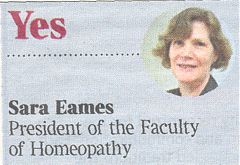
|
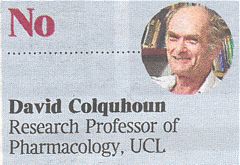
|
The problem with parliament is that there aren’t enough doctors in the House. Or at least there are too many people who seem not to be able to make a critical distinction between what you’d like to be true and what actually is true (no, I’m not talking about Iraq but about something far less important). Perhaps the prime example is David Tredinnick (Cons. Bosworth) who claimed £700 on expenses for his efforts to link astrology and alternative medicine.
Luckily there are a few MPs who are not convinced that healthcare depends on the phase of the moon, and most of them are on the parliamentary Science and Technology Committee (STC). That committee has been conducting ‘evidence checks’ in an effort to find out the extent to which government policy is based on good evidence. Last Monday they published Evidence Check 2: Homeopathy. The report restores ones faith in reason. It concluded that there is no reason to think homeopathic pills have more effect than a placebo, therefore they should not be paid for by the NHS, and neither was more research justified. The report also criticised the Medicines and Health Regulatory Authority (MHRA) for allowing misleading labelling of homeopathic pills, and the Department of Health for failing the take notice of evidence.
Let’s get one thing straight. Homeopathy is very simple indeed. The medicine (in dilutions beyond 12C) contains no medicine. Zero, zilch, nothing. That’s why it is a placebo. Arnica 30C contains not a single molecule of Arnica. It is like selling strawberry jam that has never seen a strawberry. Yet Trading Standards officers can do nothing about this gross mislabelling because loopholes in the law allow advocates of magic medicine to get away with it. It also involves the preposterous idea that the more you dilute a remedy the stronger it gets. If you want to get drunk quickly, put a drop of whisky in the Atlantic Ocean and take a drop. It is nothing sort of surreal that the matter is still being discussed after 200 years.
How did these absurd ideas ever take hold? Around 1800, when homeopathy started, conventional medicine barely existed, and giving nothing was better than being bled and poisoned. Bleeding patients had been standard medicine for hundreds of years in 1800 despite the fact that it killed people. It went on so long because it depended on anecdotes, clinical authority and wishful thinking. These are still the forms of evidence favoured by homeopaths, but real medicine has changed entirely now whereas homeopathy has remained stuck in 1800.
The problem is that homeopaths routinely misrepresent the evidence (if they didn’t they’d be out of business). The report says
”We regret that advocates of homeopathy, including in their submissions to our inquiry, choose to rely on, and promulgate, selective approaches to the treatment of the evidence base”.
The Society of Homeopaths has the nerve to offer you “An overview of positive homeopathy research”. They quite blatantly omit the very much stronger negative evidence. The only word for that is dishonesty.
A favourite with homeopaths is a 2005 study in which 6544 consecutive patients were asked how they felt after homeopathic treatment and 50% said they felt better or much better. That seems a surprisingly small proportion given that most of them would have been treated for minor self-limiting conditions, but we’ll never know because there was no comparison group at all. As evidence, this is utterly worthless,
Two other defences are commonly offered by homeopaths. One is patient choice. The other is that it doesn’t really matter if it’s a placebo if it makes you happy. Choice is fine as long as it’s informed choice. If the homeopath said “these pills contain nothing, but you might feel better after taking them anyway”, that would be fine. But homeopaths never say that. In any case to deceive the patient into thinking they are being offered real medicine when they are not poses deep ethical problems, and the Department of Health has refused to grasp that nettle. You might as well say that Chanel No 5 should be available on the NHS because it makes some people feel better. At the moment we are in the absurd position in which a doctor is not supposed to give placebo knowingly and honestly, but can refer patient to a homeopath for a dishonest placebo. The fact that the homeopath may genuinely believe in the magic is not a sufficient excuse.
If homeopaths limited themselves to minor self-limiting conditions, they wouldn’t do too much harm. But non-medical homeopaths (the vast majority, in the Society of Homeopaths) mostly have no idea of their limitations. They believe they can prevent and treat treat malaria, AIDS, cholera, yellow fever, even cancer.. At this point homeopathy ceases to be a harmless joke but becomes more like culpable homicide.
Recently two homeopaths in Australia were jailed for manslaughter after their own daughter died for want of proper treatment. That is the sort of thing that happens you put your faith in magic medicine,
Homeopathy is on a par with talking to trees. No decent health service should pay for it.
Follow-up
Goldacre has lovely piece in the Guardian.
Homeopathy doesn’t work. But are the claims for other medicines any better?
Drug ads that don’t back up their claims show how dumb doctors can be about evidence and how lax regulation has become
After the Commons science and technology committee report this week, and the stupidity of “we bring you both sides” media coverage, you are bored with homeopathy. So am I, but it gives a simple window into the wider disasters in medicine.
He sounds as bored with homeopathy as I am. He points out that while 100% of claims made by homeopaths’ advertisements are untrue, it is also the case that 30 – 60% of advertisements by Big Pharma can’t be justified by evidence. Once again we see the similarity between the alternative industry and the regular industry (though the former still comes out worse).
Michael Grayer (2 march 2010) , at nontoxic.org.uk has some trenchant comments about what the mainstream media call “balance”. What constitutes balanced coverage worries me too, and gave rise to a complaint to the BBC recently.



